#not completely positive but its all my natural true thoughts during this experience
Text
Never watched Marvel anything. I don't like superhero movies or action movies. This will not be all positive. If you can't handle jokes or critiques of your favorite thing, this is not the place to be. I am pirating all of this because I do not support Disney. I am now starting my marvel journey, let's go.
Iron Man: Why is this actually good? Am I actually enjoying myself? But also an employer x employee relationship is very weird. Don't ship it. Surprised this was an orgin story. It was cool.
Hulk: A little too heavy on the "she loves a monster" trope, but it was alright. I wouldn't write home about it.
Iron Man 2: "oh remember that one black guy in the last movie" "yeah what about it" "he's not here so let's replace him with another black guy and maybe no one will notice." Why is Elon Musk here? Better than the first. Better villain(s), more cohesive, and things felt more intentional. Bonus less corny relationship scenes... Got to the end nevermind. Same corniness.
Thor: I hate all the tilts. I actually... Didn't enjoy this one. Thor might be interesting interacting with the other members. But NOW I can finally get all the Loki jokes. The end credit was interesting though. What does it mean??? (Don't tell me.)
Break time... Am I watching superhero movies or am I watching The Notebook? I don't want to see these love stories, bro. There's not a necessity to have a 'he gets the girl" moment to make an enjoyable hero movie. It's genuinely irritating me, but I will continue until The Avengers. I'm just saying if this is all it is, I'm not continuing this marvel thing.
Captain America: "Go get him. I can swim." Let's go. Representation of kids that aren't helpless. There's no way Steve didn't look at Fury and didn't think in his head "how is this black person allowed to speak to me like this?" And then say a little racist slur. Enjoyed this more than Thor and Hulk. However, I feel like I've seen stories and watched movies like this before. The only difference is the superhero aspect. I don't know what exactly, but something different could've pushed the story further to make it more interesting. Same critique of another unnecessary love story in my superhero film. From what I've seen, I can understand why people ship Bucky and Steve. I'm not really feeling the ship. Maybe that will change. So far none of the heroes have been catching my eye. I haven't got that moment of 'that's my new favorite character.'
The Avengers: This is what I've been waiting for! I have a couple of marvel movies that I've been trying to get to and this is one of four. Literally the shield agents are put there to die, not the main protagonists of course, but all those agents immediately get killed by the antagonists. They changed hulk too? Honestly, don't mind it. Loki is the definition of daddy issues. I can see why so many tumblr people relate to him. Not the "kneel." Loki is a sub who wants to dom, but he can't. Possible power bottom? Seeing all these movies in this order, despite how much I HATED the love stories in between, it really set up this movie nicely. I understand everyone's individual battles and personalities that I wouldn't have if I just started with this. Mister Fury is really irritating me at this moment of time. I know they're supposed to be the superheroes, but I would not feel safe in any city they're in. They're out here destroying major cities. I wish Hulk's thing made more sense. Now he can suddenly control Hulk to attack specific people/things when a couple of hours ago he was fighting the whole team? They should've addressed that. THIS IS WHAT I'M TALKING ABOUT. THIS IS WHAT I WANTED FROM THIS SERIES OF MOVIES. I guess I will be continuing marvel movies.
#personal post#my commentary#movie commentary#i swear on my life#i will block anyone who even tries to slightly spoil this for me#i dont care if its i cant wait until blank of i cant wait until this specific movie#or theres a sad moment in blank#or get your tissues during this movie#you will get blocked and im not joking#not completely positive but its all my natural true thoughts during this experience#not cosplay
3 notes
·
View notes
Text
Interpreting the Spider-Man: Alien Costume Saga as a metaphor for OCD
Awhile back I was revisiting the classic Spider-Man: Alien Costume Saga for the first time its entirety in the two "Complete Epic" TPBs Marvel published which collect both the Amazing Spider-Man and Spectacular Spider-Man issues which comprised the saga. When I read the concluding issue of volume one, Amazing Spider-Man #258 by written by Tom DeFalco & illustrated by Ron Frenz, I came to an interesting realization: there are actually some striking parallels between Peter's experiences with the symbiote and some of my own struggles with Obsessive Compulsive Disorder, or OCD.

This comparison might seem random at first, but let me try to explain it.
A major element of OCD aside from dealing with the constant and uncomfortable repetition of intrusive and anxiety-inducing thoughts, is the feeling of being overwhelmed by multiple forms of pressure (both internal and external) all at once. You feel like you have no control over the events of your life, but you simultaneously find it very difficult to find the willpower and initiative necessary to take active steps for positive improvement.
So when you look at the plot of the original Alien Costume Saga, Peter Parker is facing external pressure on multiple fronts: his Aunt May refusing to speak to him after he dropped out of Graduate School, Robbie Robertson being a much stricter boss at the Daily Bugle, relationship struggles with Black Cat, facing multiple supervillains as Spider-Man, and Mary Jane just now dropping the major bombshell that she's known Peter's secret identity for several years now! Because of all this, Peter feels like he's losing control over his life, and the black suit makes those feelings quite literal by unknowingly possessing his body at night to go for web-slinging joyrides while he sleeps, therefore making him even more exhausted than he already was beforehand, sleeping entire days in.

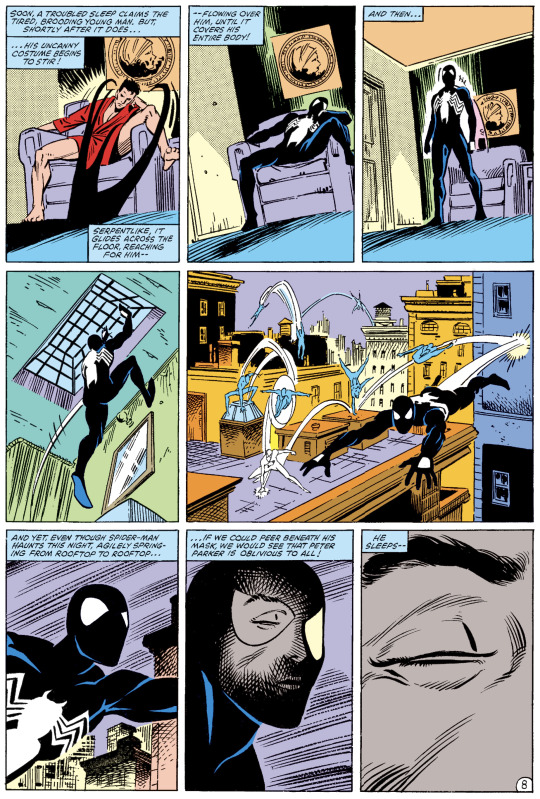
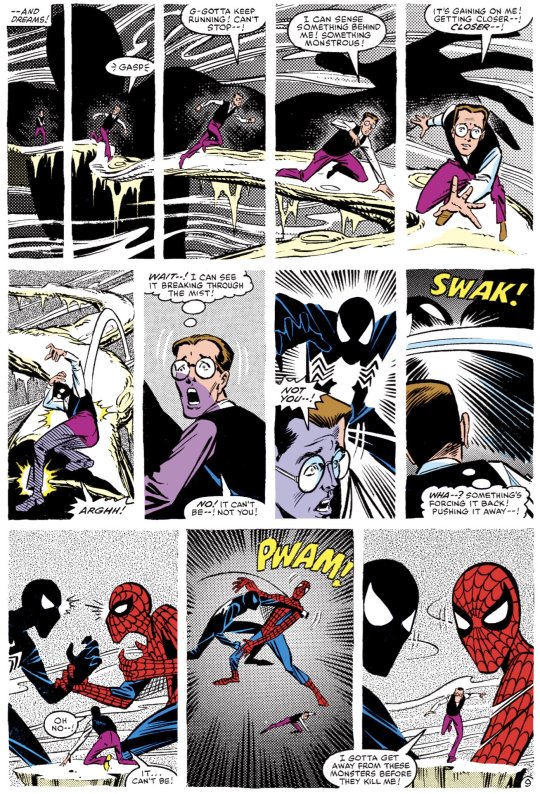
But it eventually all culminates in a breaking point for Peter. Following the infamous dream-sequence where gigantic versions of Spider-Man's red-&-blue and black costumes are fighting for possession over Peter's body, Peter finally decides to finally take some active steps to regain control over his life. The first and foremost of these steps is to no longer procrastinate on Reed Richard's previous offers to scientifically analyze the black suit. Something which Peter decided to do just now after noticing the suit acting strangely more than once. It's finally upon Reed's analysis that Peter discovers the alien costume's true nature as a living symbiote that's determined to permanently bond itself onto Peter's body.


OCD operates in a similar manner, in that only by acknowledging which thoughts are OCD and which are not can you deduce the root cause of your mental anxiety and start take the steps to combat it. And OCD, just like the symbiote, often refuses to let go of its grasp on you without a fight, but certain steps can be taken to effectively do so such as when Reed deduces the symbiote's key weaknesses of fire and sonics.
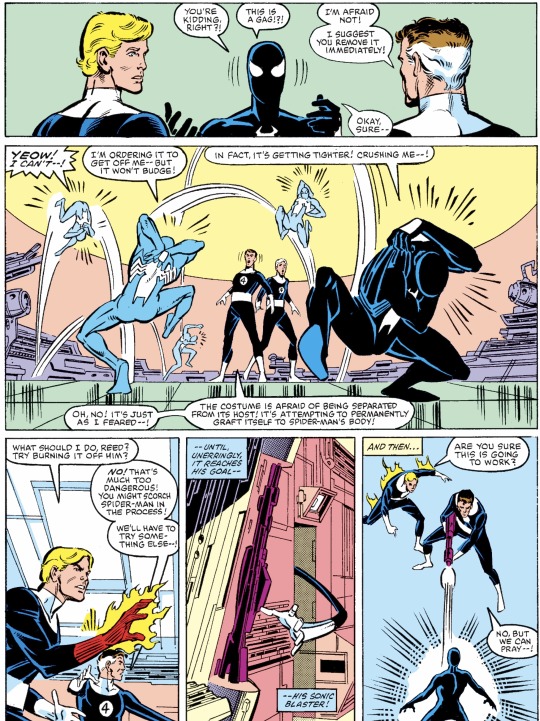
Some people might be confused why in my summary of the events building up to Amazing Spider-Man #258, I neglected to mention Peter struggling with the symbiote negatively influencing his emotions a encouraging him to commit evil actions, or the symbiote's future host Eddie Brock, aka Venom?
The thing is, those aforementioned elements debuted in adaptations of the Alien Costume Saga outside of comics like the 90s Spider-Man: The Animated Series and Sam Rami's Spider-Man 3, which future comics later retroactively included as being part of the original storyline. When Spidey's black costume was first introduced in the comics during the 1980s, and the idea of it being a living symbiote or even the character of Eddie Brock/Venom wasn't even conceived by the writers at the time. The original idea of a black costume for Spider-Man was actually originally conceived of by a fan named Randy Schueller, who pitched the idea to Marvel in a talent-search contest, describing to CBR in 2007:
"I thought it would be cool if Spidey needed to upgrade his powers and his look, so I came up with this idea that Reed Richards had made a new costume for Spidey using the same unstable molecules that the FF costumes are made of. The unstable molecules would flow into Peter’s pores and allow him to cling to walls better. I think my original idea was to increase his sticking power by 25% or something like that."
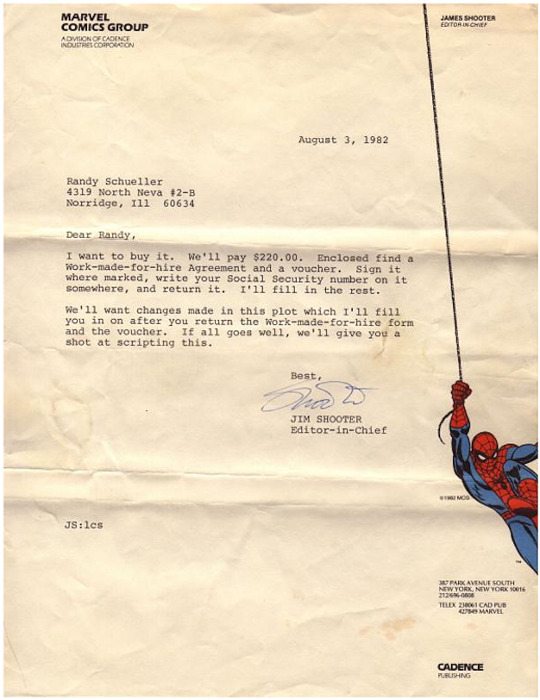
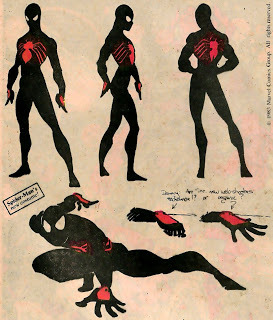
Then Marvel Editor-in-Chief Jim Shooter bought the idea from Schueller for $220, but instead of Schueller's initial concept the black shape-shifting costume idea was integrated into the Marvel Superheroes Secret Wars event from 1985, originally presented as costume made from some sort of weird alien fabric. Additionally, writer/artist John Byrne stated on his personal website that he had conceived of the idea of a self-repairing biological costume while illustrating Iron Fist, but when he ended up not using it for that title he was asked by Roger Stern if he could use the idea for his Spider-Man run. Interestingly enough however, while the black suit chronologically first appeared in Secret Wars #8, the alien costume's first appearance publication-wise was in Amazing Spider-Man #252 (the last issue Stern plotted for his iconic run), released a few months prior. The way Secret Wars tie-ins were handled was via a time-skip similar to DC's "One Year Later" initiative following Infinite Crisis event published two decades later, with the 52 maxiseries filling in the gaps of missing year in-universe.


In the publication time between Amazing Spider-Man #258 and Secret Wars #8 however, a lot of fans surprisingly really hated Spider-Man's new black costume. Long-time readers were initially offended by the idea of Spidey receiving a costume change, which is something that had never occurred since the character's debut in the 1960s. Marvel caved into the vocal fan-backlash and by Amazing Spider-Man #258 that the costume was actually a living alien symbiote that sought to permanently bond itself to Peter's body, with this revelation being foreshadowed in the previous intervening issues as the symbiote began taking Peter's body for web-slinging joyrides while he slept. However, by the time the symbiote retcon was introduced and Peter discarded the alien costume, fans had actually grown to love the black costume over the intervening months, which led to Peter quickly obtaining a cloth version of the black suit from Black Cat that he would frequently alternate with.
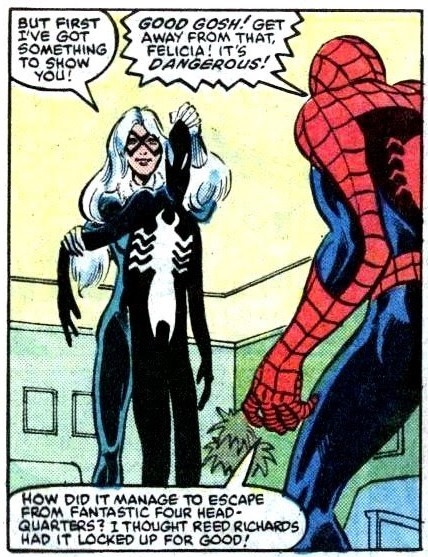

As for how Venom would come to enter the equation, Eddie Brock's first full appearance would be in Amazing Spider-Man #300, written by David Michelinie & illustrated by Todd McFarlane. While Michelinie has stated in interviews that he was solely responsible for the creation of Brock as a disgraced journalist who held a personal grudge against Spider-Man, the idea of him becoming the next host of the alien symbiote can actually be primarily attributed to McFarlane. See, McFarlane absolutely HATED drawing the cloth version of Spidey's black costume and desperately wanted to have Peter return to his classic red-&-blue suit. McFarlane stated:
"I came into the Spider-Man office after doing the Hulk and they wanted me to do Spider-Man," McFarlane explained. "But he was in this black costume. I didn't wanna draw this black costume. It meant nothing to me. I wanted to draw the red and blue... So, they said, 'Todd, if you just come on at #298 we promise that maybe we can get rid of it.' And I go, 'Well let's just get rid of it fast!’ So, I did a character... I ripped the costume off him... I did this character called Venom, handed it to David Michelinie, the writer, and they said, 'Just hold on, hold on, hold on,' he continued. So, then, all of a sudden I do #298, he's still in the black, #299, he's still in the black, finally #300, look I even said here on the cover sketch, 'Can we do one in the black and the red? Come on, I want to do the black and the red.' And they said, 'Yeah, yeah, yeah, fine.'"
To achieve this end, David Michelinie ended Amazing Spider-Man #299 with the cliffhanger of Mary Jane being suddenly frightened by Venom in her and Peter's apartment, and following Spidey's battle with Venom in the following issue, MJ demanded that Peter get rid of his cloth black suit due to how much it reminded her of Venom.

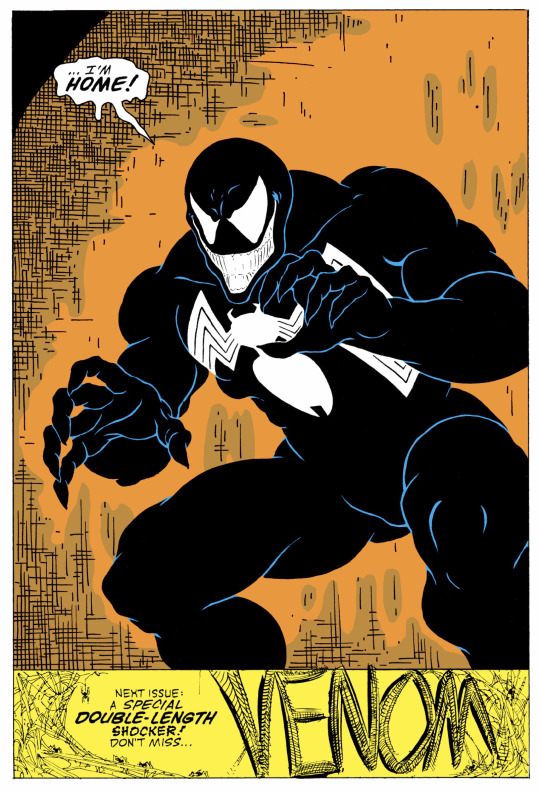

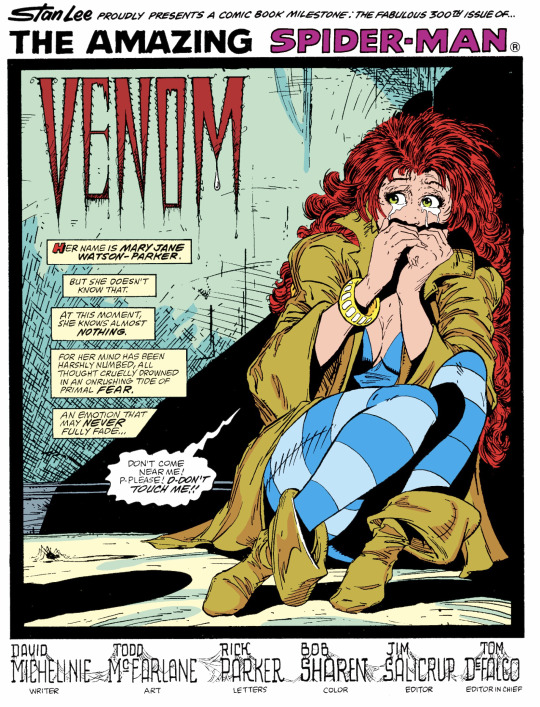
And Eddie Brock was introduced by Michelinie, whom during off-panel events from The Death of Jean DeWolffe storyline wrote a series of interviews with a man he believed to be the serial killer Sin-Eater for the Daily Globe, before being later pressured to publish the Sin-Eater's identity. However, Brock was fired due to Spider-Man catching the true Sin-Eater literally minutes after Eddie's article was published. Disgraced and humiliated, Brock developed an intense hatred for Spider-Man, and later bonded with the alien symbiote when the two encountered each other in the church bell tower where Peter famously discarded the black suit in Web of Spider-Man #1, which was the final issue of the original Alien Costume Saga.
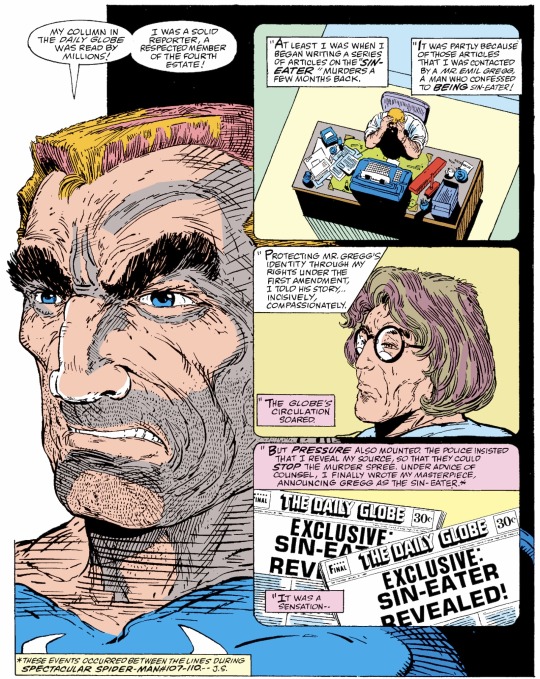
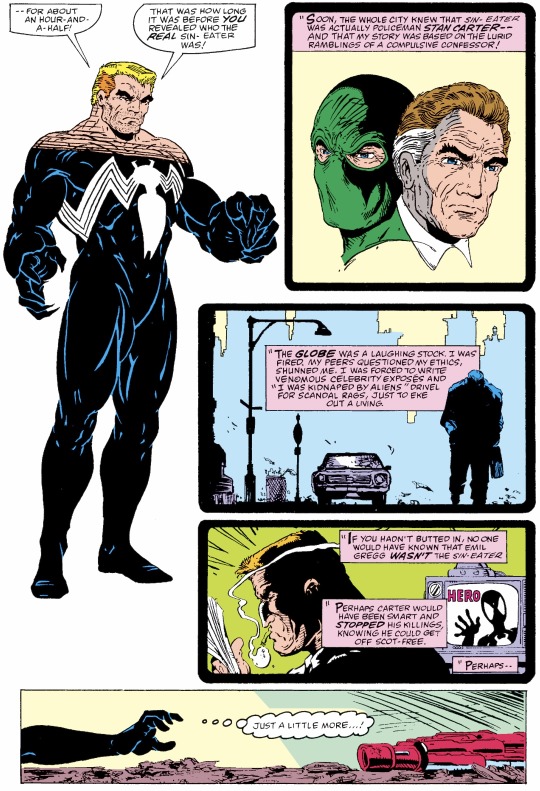
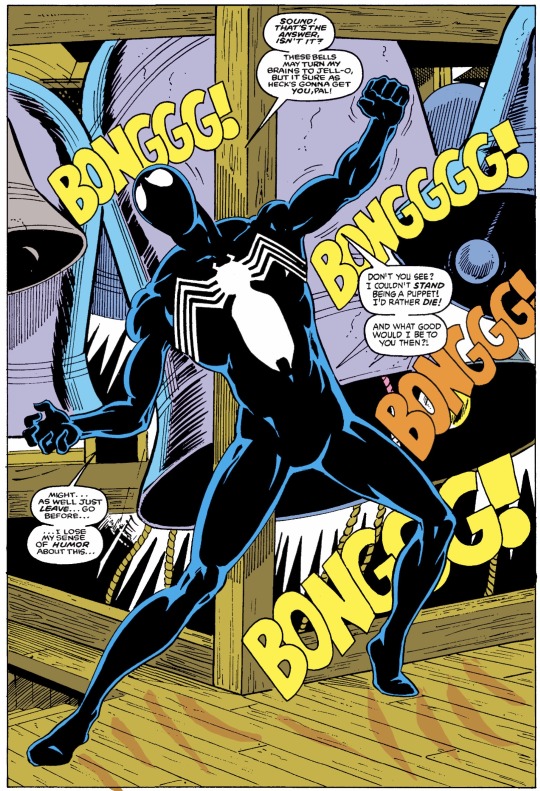
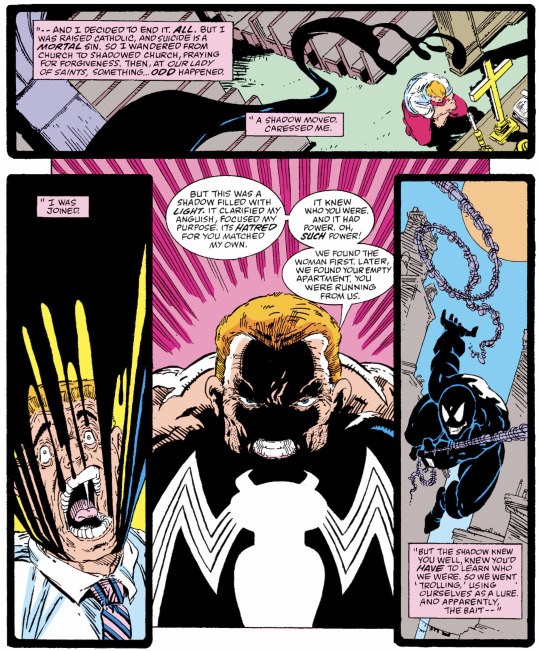
Ironically, Randy Schueller, the aforementioned fan who originally pitched the black costume idea to Marvel, was actually not a fan of Venom himself, describing the character of Eddie Brock as “disturbed," stating that:
“I was never a fan of the costume-turned-villain idea. Venom just never really seemed to work for me.”
But going back to the symbiote's pre-Venom portrayal in the Alien Costume Saga... in a sense one could actually view the original depiction of symbiote suit as an effective metaphor for dealing with some of the symptoms of OCD!
#spider man#alien costume saga#black suit#symbiote#peter parker#venom#venom symbiote#eddie brock#marvel comics#tom defalco#ron frenz#david michelinie#todd mcfarlane#jim shooter#john byrne#roger stern#mental health#intrusive thoughts#obsessive compulsive disorder#mini essay#neurodivergence
13 notes
·
View notes
Text
✰ ◞ TEAM UNKNOWN FINAL MEETING.
and thus, the curtains close on this act.
there's an odd sensation resting on the precipice of her shoulders, a weight that teeters back and forth between a burden far too heavy to lift, and the touch of long-awaited relief. mixed somewhere deep within, confusion, a perplexity nina can't seem to untwine from the tendrils of expectancy these last few months have allowed to fester in the pit of her stomach. at one point, back when their trainee group had first been curated, she'd been so sure that, initial hesitance aside, they'd eventually be able to decipher just what this would all be about.
it was all too particular, planned and organized in a way far too odd to be solved by ordinary means, and thus, ninas preconceived notions had all but quickly died a few days into their tiny groups first week.
now, having pushed through, the finish line right at the tips of her toes as she herded to her final meeting, nina still can't tell which way was up and which was down.

anything could happen at this point ( in fact, anything had happened— anything was what got her in this position to begin with, an unforeseen occurrence she'd still need more time to digest on her own, even now that it was all seemingly completed ).
alone time would come to her eventually. now, entering the meeting room and sitting before her appointed coach, there were a few final questions that needed reflecting.
"what was the hardest part during these last ten weeks?"
"dancing hasn't ever been one of my strongest suits, i think that's something we might be able to agree on," nina begins, candid, wanting to get straight to the point. there wasn't a need to dwindle, not when honesty was something she'd never had an issue with providing— not when it came to performance, a reflection of skills, and the talk of growth. "all this time, i'd thought i'd done well to improve that aspect of my skill set, but this whole experience was a bit of a wake-up call. i could've been doing more before this." with the emphasis she'd always pushed onto her vocal capabilities, it seemed only natural for dancing to take something of a hit, lacking in proper attention outside of what was mandatory. week two had been a proper kick in the ass, and while she'd managed to make it through with a little help and true signs of growth, that hadn't saved her body from feeling thoroughly throttled.
even now, parts of her ached that'd never felt such a sensation before. learning the choreography for antifragile had been a particular beast, all on its own. growing pains, with plenty more to come if she truly meant to stick by her newfound convictions. "the dance lessons proved to be my biggest challenge, but they helped."
"alright, then what was the easiest part?"
again, nina feels as though it's quite an obvious answer. "i'm a vocalist— a singer." there's a pause, a moment for her to collect her words, rifling through what she'd like to say. "week one hadn't ever been something i found myself feeling worried over. don't get me wrong, we sped through several techniques and lessons, far more than i was expecting us to tackle in such a short amount of time, but adapting wasn't hard. i enjoyed it the most, in fact— there's nothing wrong with circling back to basics or touching on more advanced skills." nina tries not to mull over her words too much, wanting only to share where her mind has been for the last two months. "i wouldn't mind taking part in more intensive vocal lessons like this again in the future."
"throughout all of this, have you learned anything new about yourself?"
now that . . . gives her momentary pause. they were pushing, prodding, digging deep with claws too sharp and intrusive. it was one thing to make self-discoveries— it was another to then bare one's vulnerability to those who might not always understand. for as honest as she was wanting to be, trying to be, truly letting go and allowing others in ( especially when they weren't anywhere near close to breaking her boundaries ) was cause for inner alarm. of course they'd want to know something like this, a prolonged, stress-inducing event such as this was almost always a breeding ground for personal growth. nina remains silent, lips pursed slightly as she gazes at the table separating herself from the coach.
against the bile, nina speaks. "i've learned that i'm capable of asking for help when i really need it." her voice is steady, even, and her gaze lifts to make eye contact. "i'm not the only person here, experiencing all of . . . this," with her hands, she gestures vaguely around her. "the perspectives and input of other people really can help broaden things." i just have to stop being so stubborn all the time.
"finally, what do you wish to accomplish from this point on?"
swallowing, nina straightens in her chair slightly. "growth is always something i'm working towards, in all aspects." this past year alone has proven to her how detrimental throwing all your eggs into one basket could truly be, a damaging fall from heights unthought of forcing her to really see her world for what it truly was— there wasn't room to slack, not anymore, not when slacking even the slightest bit could mean the difference between being seen and being overlooked.
"i want to keep honing my skills. growing stagnant hurts more than anything else, and that's the last thing i want for myself."
i don't want to hurt again. i will not hurt again.
3 notes
·
View notes
Text
5 Positive Signs During Separation
Quick story. About 7 months ago, she decided to go for trial separation but things have basically been in a limbo since then.
--> READ THE BLOG POST HERE
https://lolaandola.com/5-positive-signs-during-separation/
--> WATCH VIDEO VERSION HERE
https://youtu.be/042d0e2lzbI
At the time, she was 8 months pregnant and taking care of 2 kids at the same time with no help whatsoever from the husband.
She would complain but he would just apologize and promise to work on it; then repeat the same cycle over again.
So she got tired of the empty promises and went for the trial separation. She thinks she is seeing some changes now but not too sure if he's faking it or he's actually doing the work.
There have been times in the past that she thought things were better even up to a year ago, forgave… but now... she wouldn't even allow him to touch her.
She claims the sex was horrible because of how she felt towards him at the initiation of the trial separation.
Though she took full responsibility for her portion of the decline in the marriage, he refused to see any issues which left her with no choice but to let him figure himself out.
Hence the separation that started 7 months ago.
Now, she is feeling much better but wants to know if there are any positive signs to look out for during this separation to determine if it's working in the favor of the marriage or if it's a lost cause.
So we want to share just five signs with you to look out for to determine if a good and healthy reunion is in sight.
Sign Number 5
Becoming Friends
Sadly in these modern times, most people trying to fight for their marriage end up in big English grammatical echo chambers where all they will learn is how to diagnose their partners psychologically.
You will hear diagnoses such as narcissism, controlling, insecure etc... to the point where they don't know how to recognize normal interaction any longer.
The sad part is that people, even when they are not professionals or have any experience, will make blanket bold statements such as once a... (fill in the blank)... always a (fill in the blank.)
So it becomes extremely hard to see a simple positive sign in separation such as becoming friends again.
This one thing is priceless and you can't buy it with money. Believe it or not, you can buy a wife, a husband, a girl or boyfriend. But you can't buy a friend.
So if you are in the middle of separation and you are noticing that friendship is finding its way back, that is a strong foundation to build upon if you are willing.
Sign Number 4
Sharing Space
Well, the whole point of separation also involves physical distance. But we are humans and distance, they say, makes the heart fonder.
This is especially true if there was some type of friendship before things went completely left. If that was the case, friends who are also lovers tend to find their way back into the same space.
Maybe not necessarily living under the same roof, but you find that you are able to share space together even if it's with other mutual friends.
That, my friend, is a great foundation to start working on your marriage together.
Many separated couples do not have that luxury and it's worth appreciating and leveraging as a positive sign during your separation.
Again... simple but powerful.
Sign Number 3
Share Entertainment
Every separation comes with some damages that can creep back as resentments and try to destroy your marriage even after reconciliation and reuniting back together.
With the right tools, you can and will sustain such forces.
You are in a team together so you ultimately have a better leverage against any outside forces if you are aware of your power as a team.
Quick story.
For us... even after creating some damage, we would end up sitting and watching TV shows together, sharing links of memes, funny and viral videos back and forth.
If you are blessed with this type of scenario, that is a positive sign during separation.
Sign Number 2
Acceptance
Naturally you are observing your partner.
I say that because you may be using the "no contact rule" as a tool to boost attraction but hopefully-primarily to take time to boost your self confidence and self esteem.
But naturally you are observing your partner… at least occasionally.
We are talking about your spouse here... in the middle of probably the painful experience of separation on both sides.
So you are observing if we are being honest.
In that observation, are you noticing more acceptance of the reality of the possibility of the marriage ending for good?
I know this may be counter-intuitive.
But if you are noticing this, that's what you need because it's a sign of wholesomeness on your partner's part. It means the quality of being beneficial and generally good for you.
When you are self-sustainable as individuals, you dramatically increase the chance that your marriage will be self-sustainable and not drain life out of one or both of you.
Let me ask you a question...
Can you personally and confidently survive and thrive if you have to do that without your husband?
Please answer in the comment space below.
Sign Number 1
Sex
Listen. You are humans like the rest of us here. If you mistakenly broke your own rule and have sex with your partner during separation, that's could be a positive sign.
Sex can also be a negative sign. You may just be addicted to a terrible sex-based relationship.
If you are D or P whipped, when you clearly feel terrible emotionally after the session, that's a negative sign.
But if you lined up the other signs from sign number five to two that we previously shared with you, this is definitely a positive sign that you can turn into a foundation.
Speaking of foundation...
Don't attempt reconciliation or getting back together without engaging in good counsel, coaching or therapy. Healing is necessary in order to not create the same bad cycle all over again.
We are speaking from experience. We share our own story inside the book "GET MY MARRIAGE BACK" which you can download for free at www.GetMyMarriageBack.com
Please support this video by hitting the thumbs up and share with us below what you'd like us to cover on the next video.
Check out this episode!
0 notes
Text
They say you have to lose yourself to find yourself...
I lost myself. I'm not entirely sure of who I really was to begin with, all I know is that I lost myself somewhere along the way. My humour turned into hyper sensitivity, being easily offended and abrupt. My levels of stress lead to breaking down over the most minute and unimportant/easily fixed situations. My personality was shot, its like I didn't have one anymore. I lost my sassy, yet fun and respectful self. The girl who was witty, spunky and full of life was no more. I was just a shell of a person, going about my day to day life. I remember first thinking about suicide. Prior to that, I had never understood it. I always wondered "How could someone hate life, such a beautiful and joyous thing, so much that they don't want to be here anymore?" I just couldn't comprehend how someone could be so sad, so lonely, so confused. I had always had sympathy for those who were so sad, I just wanted to make them feel better, but I didn't truly understand that is, until I experienced it myself. What was sympathy, had turned to empathy and completely changed my outlook on life.
I remember my father saying "People think they're depressed? They don't know what true depression is like. If they want to kill themselves they should just do it." I remember how jarring that was to hear him say that. How uncaring and cold he sounded. It shocked me to hear someone have such an awful opinion on a sensitive topic.
I rarely agreed with what my father ever said. I remember early on there was a point where I just knew he was wrong about things so I never trusted his opinion and just stopped listening to his rants altogether. I know he had been through some very difficult times, but I don't think he was ever justified in minimizing others experiences- especially when he doesn't know anything about other people's lives, but that's just it. He doesn't care.
One thing about myself that I've always admired is my caring nature. It has taken me a long time to be able to even say that about myself. For reference, I am 25- turning 26 in August. All of my life I have only said things to put myself down. I didn't think there were any redeeming qualities about myself, but here we are. I am now able to say one positive thing about myself, to myself.
At times, I feel like I have been "burnt-out" or "jaded". I felt I was mistreated for who I was- and that's partly true, but I'm recognizing that a lot of it is how I've perceived certain situations or reactions from others. For example, at a recent job I had, I worked my ass off. Sometimes to do the bare minimum was difficult enough to do due to lack of resources, training and assistance, however I believe I tried my best every day I stepped foot onto that floor. I was treated pretty badly by coworkers and I felt unappreciated. This was during the peak of the pandemic and that is the first time I began to feel really bad about myself and about others. I felt like if people thought I didn't deserve compassion or respect, why should I be giving that to them? I was in a battle with myself. For so long I have always lived by "Be kind to others, regardless of how they treat you. Those who treat you badly are sad with themselves. No happy person is disrespectful to others." However, this way of thinking was running thin at one of the worst times in my life. I developed a different mentality of "I don't care anymore. If someone is rude to me, I'm going to match their energy." We all know fighting fire with fire is no way to progress anywhere, however, I felt like if someone wanted to snap at me and insult me when I had done nothing to them, they didn't deserve kindness themselves. I worked in a toxic, miserable environment and It seemed as though the bitterness of others was rubbing off on me.
I don't remember ever being outright rude to others, however, I did remember how they treated me, and I didn't forget it. I thought about it with every interaction we had. I continued to try to be kind, a lot of that being me avoiding conflict and attempting to people-please, however, I found I was starting to hold grudges on people, and was complaining to my family/significant other about these people. I also was becoming snappy and annoyed with others who were overtly unkind. I wasn't addressing anything but I also felt like "Why should I have to explain to an adult that they should be nice?"
The fact of the matter is, a lot of people don't realize that they are being rude and that is not the intention of many people. A lot of it also has to do with your perception/interpretation and reaction to something. Maybe you're finding what they're saying to be rude but it really isn't. You have to check yourself in these situations because you are not a special, delicate being that is free from criticism. People are allowed to, and should be calling you out if it's deserved. This can be and should be done in a kind way of course, but it's up to you not to be defensive and rude. Meet people where they are at, but also kill them with kindness. Also, if you feel like someone is mistreating you, SPEAK UP. Tell them and address it with them. If they aren't receptive to that, then you have to do what you need to do to stop that behaviour, whether it be putting your foot down, or speaking to someone higher up.
On the flip side, some people are ill-intentioned and are purposefully trying to be rude, but again, that is a fault within themselves. For example, a coworker of mine harshly criticized the appearance of another coworker on a lunch break. She brought it up so casually as well, as if saying things like this were just second nature to her. The comment she made was very nasty- flat out calling another woman "ugly" and saying she looked "like a mess" and "really old" and also stating she hoped she doesn't look as bad as them for being the same age. She wasn't talking to me, but I didn't say anything and I really regret that. I sat there, shocked at what I was hearing. I was in disbelief that someone could so openly share such a horrible thought with 4 of her peers in the room. It was truly disgusting. I said nothing and I'm ashamed. A couple people laughed, myself and another sat quietly. That would have been a great opportunity to step up and say "You know what? That was really unkind and unnecessary." However, its truly hard to find that courage in that scenario, especially when you least expect it. I'm going to work on that.
I know, I know, people do worse things than calling other people ugly but it starts with that. Making such a stupid and horrible comment about someone is only done to make you feel better about yourself and its honestly shameful. There's no need for it. Its not cute, funny or quirky. You're just a mean person.
It took me some time to come around full circle, however, I do believe that those who mistreat others are doing that from a place of hurt. They are projecting their insecurities, jealousy, anger, sadness, negativity, whatever it may be, onto others because misery loves company.
I empathize with those people as well. I'm not perfect. There were times in my life I have projected and been mean to others. I feel like most if not all people have done this at some point in their lives. What's important is that you come to realize this is unhealthy and problematic and you ADDRESS it. You work on it. This is not the fault of other people. It's a fault within YOU. Making harsh comments on someones appearance or being overly critical about how someone is performing is NOT constructive criticism.
To add, even if it wouldn't offend you, doesn't mean that another person won't be offended. HOWEVER, don't give people the power to hurt you. You choose how you react and combat certain situations. It's extremely difficult, and something that needs continuous practice, but it is possible.
I am ranting at this point but again, it feels good to get this out of my system. This is self reflection. This is accountability.
We only go up from here.
0 notes
Text
The Green Knight and Medieval Metatextuality: An Essay
Right, so. Finally watched it last night, and I’ve been thinking about it literally ever since, except for the part where I was asleep. As I said to fellow medievalist and admirer of Dev Patel @oldshrewsburyian, it’s possibly the most fascinating piece of medieval-inspired media that I’ve seen in ages, and how refreshing to have something in this genre that actually rewards critical thought and deep analysis, rather than me just fulminating fruitlessly about how popular media thinks that slapping blood, filth, and misogyny onto some swords and castles is “historically accurate.” I read a review of TGK somewhere that described it as the anti-Game of Thrones, and I’m inclined to think that’s accurate. I didn’t agree with all of the film’s tonal, thematic, or interpretative choices, but I found them consistently stylish, compelling, and subversive in ways both small and large, and I’m gonna have to write about it or I’ll go crazy. So. Brace yourselves.
(Note: My PhD is in medieval history, not medieval literature, and I haven’t worked on SGGK specifically, but I am familiar with it, its general cultural context, and the historical influences, images, and debates that both the poem and the film referenced and drew upon, so that’s where this meta is coming from.)
First, obviously, while the film is not a straight-up text-to-screen version of the poem (though it is by and large relatively faithful), it is a multi-layered meta-text that comments on the original Sir Gawain and the Green Knight, the archetypes of chivalric literature as a whole, modern expectations for medieval films, the hero’s journey, the requirements of being an “honorable knight,” and the nature of death, fate, magic, and religion, just to name a few. Given that the Arthurian legendarium, otherwise known as the Matter of Britain, was written and rewritten over several centuries by countless authors, drawing on and changing and hybridizing interpretations that sometimes challenged or outright contradicted earlier versions, it makes sense for the film to chart its own path and make its own adaptational decisions as part of this multivalent, multivocal literary canon. Sir Gawain himself is a canonically and textually inconsistent figure; in the movie, the characters merrily pronounce his name in several different ways, most notably as Sean Harris/King Arthur’s somewhat inexplicable “Garr-win.” He might be a man without a consistent identity, but that’s pointed out within the film itself. What has he done to define himself, aside from being the king’s nephew? Is his quixotic quest for the Green Knight actually going to resolve the question of his identity and his honor – and if so, is it even going to matter, given that successful completion of the “game” seemingly equates with death?
Likewise, as the anti-Game of Thrones, the film is deliberately and sometimes maddeningly non-commercial. For an adaptation coming from a studio known primarily for horror, it almost completely eschews the cliché that gory bloodshed equals authentic medievalism; the only graphic scene is the Green Knight’s original beheading. The violence is only hinted at, subtextual, suspenseful; it is kept out of sight, around the corner, never entirely played out or resolved. In other words, if anyone came in thinking that they were going to watch Dev Patel luridly swashbuckle his way through some CGI monsters like bad Beowulf adaptations of yore, they were swiftly disappointed. In fact, he seems to spend most of his time being wet, sad, and failing to meet the moment at hand (with a few important exceptions).
The film unhurriedly evokes a medieval setting that is both surreal and defiantly non-historical. We travel (in roughly chronological order) from Anglo-Saxon huts to Romanesque halls to high-Gothic cathedrals to Tudor villages and half-timbered houses, culminating in the eerie neo-Renaissance splendor of the Lord and Lady’s hall, before returning to the ancient trees of the Green Chapel and its immortal occupant: everything that has come before has now returned to dust. We have been removed even from imagined time and place and into a moment where it ceases to function altogether. We move forward, backward, and sideways, as Gawain experiences past, present, and future in unison. He is dislocated from his own sense of himself, just as we, the viewers, are dislocated from our sense of what is the “true” reality or filmic narrative; what we think is real turns out not to be the case at all. If, of course, such a thing even exists at all.
This visual evocation of the entire medieval era also creates a setting that, unlike GOT, takes pride in rejecting absolutely all political context or Machiavellian maneuvering. The film acknowledges its own cultural ubiquity and the question of whether we really need yet another King Arthur adaptation: none of the characters aside from Gawain himself are credited by name. We all know it’s Arthur, but he’s listed only as “king.” We know the spooky druid-like old man with the white beard is Merlin, but it’s never required to spell it out. The film gestures at our pre-existing understanding; it relies on us to fill in the gaps, cuing us to collaboratively produce the story with it, positioning us as listeners as if we were gathered to hear the original poem. Just like fanfiction, it knows that it doesn’t need to waste time introducing every single character or filling in ultimately unnecessary background knowledge, when the audience can be relied upon to bring their own.
As for that, the film explicitly frames itself as a “filmed adaptation of the chivalric romance” in its opening credits, and continues to play with textual referents and cues throughout: telling us where we are, what’s happening, or what’s coming next, rather like the rubrics or headings within a medieval manuscript. As noted, its historical/architectural references span the entire medieval European world, as does its costume design. I was particularly struck by the fact that Arthur and Guinevere’s crowns resemble those from illuminated monastic manuscripts or Eastern Orthodox iconography: they are both crown and halo, they confer an air of both secular kingship and religious sanctity. The question in the film’s imagined epilogue thus becomes one familiar to Shakespeare’s Henry V: heavy is the head that wears the crown. Does Gawain want to earn his uncle’s crown, take over his place as king, bear the fate of Camelot, become a great ruler, a husband and father in ways that even Arthur never did, only to see it all brought to dust by his cowardice, his reliance on unscrupulous sorcery, and his unfulfilled promise to the Green Knight? Is it better to have that entire life and then lose it, or to make the right choice now, even if it means death?
Likewise, Arthur’s kingly mantle is Byzantine in inspiration, as is the icon of the Virgin Mary-as-Theotokos painted on Gawain’s shield (which we see broken apart during the attack by the scavengers). The film only glances at its religious themes rather than harping on them explicitly; we do have the cliché scene of the male churchmen praying for Gawain’s safety, opposite Gawain’s mother and her female attendants working witchcraft to protect him. (When oh when will I get my film that treats medieval magic and medieval religion as the complementary and co-existing epistemological systems that they were, rather than portraying them as diametrically binary and disparagingly gendered opposites?) But despite the interim setbacks borne from the failure of Christian icons, the overall resolution of the film could serve as the culmination of a medieval Christian morality tale: Gawain can buy himself a great future in the short term if he relies on the protection of the enchanted green belt to avoid the Green Knight’s killing stroke, but then he will have to watch it all crumble until he is sitting alone in his own hall, his children dead and his kingdom destroyed, as a headless corpse who only now has been brave enough to accept his proper fate. By removing the belt from his person in the film’s Inception-like final scene, he relinquishes the taint of black magic and regains his religious honor, even at the likely cost of death. That, the medieval Christian morality tale would agree, is the correct course of action.
Gawain’s encounter with St. Winifred likewise presents a more subtle vision of medieval Christianity. Winifred was an eighth-century Welsh saint known for being beheaded, after which (by the power of another saint) her head was miraculously restored to her body and she went on to live a long and holy life. It doesn’t quite work that way in TGK. (St Winifred’s Well is mentioned in the original SGGK, but as far as I recall, Gawain doesn’t meet the saint in person.) In the film, Gawain encounters Winifred’s lifelike apparition, who begs him to dive into the mere and retrieve her head (despite appearances, she warns him, it is not attached to her body). This fits into the pattern of medieval ghost stories, where the dead often return to entreat the living to help them finish their business; they must be heeded, but when they are encountered in places they shouldn’t be, they must be put back into their proper physical space and reminded of their real fate. Gawain doesn’t follow William of Newburgh’s practical recommendation to just fetch some brawny young men with shovels to beat the wandering corpse back into its grave. Instead, in one of his few moments of unqualified heroism, he dives into the dark water and retrieves Winifred’s skull from the bottom of the lake. Then when he returns to the house, he finds the rest of her skeleton lying in the bed where he was earlier sleeping, and carefully reunites the skull with its body, finally allowing it to rest in peace.
However, Gawain’s involvement with Winifred doesn’t end there. The fox that he sees on the bank after emerging with her skull, who then accompanies him for the rest of the film, is strongly implied to be her spirit, or at least a companion that she has sent for him. Gawain has handled a saint’s holy bones; her relics, which were well known to grant protection in the medieval world. He has done the saint a service, and in return, she extends her favor to him. At the end of the film, the fox finally speaks in a human voice, warning him not to proceed to the fateful final encounter with the Green Knight; it will mean his death. The symbolism of having a beheaded saint serve as Gawain’s guide and protector is obvious, since it is the fate that may or may not lie in store for him. As I said, the ending is Inception-like in that it steadfastly refuses to tell you if the hero is alive (or will live) or dead (or will die). In the original SGGK, of course, the Green Knight and the Lord turn out to be the same person, Gawain survives, it was all just a test of chivalric will and honor, and a trap put together by Morgan Le Fay in an attempt to frighten Guinevere. It’s essentially able to be laughed off: a game, an adventure, not real. TGK takes this paradigm and flips it (to speak…) on its head.
Gawain’s rescue of Winifred’s head also rewards him in more immediate terms: his/the Green Knight’s axe, stolen by the scavengers, is miraculously restored to him in her cottage, immediately and concretely demonstrating the virtue of his actions. This is one of the points where the film most stubbornly resists modern storytelling conventions: it simply refuses to add in any kind of “rational” or “empirical” explanation of how else it got there, aside from the grace and intercession of the saint. This is indeed how it works in medieval hagiography: things simply reappear, are returned, reattached, repaired, made whole again, and Gawain’s lost weapon is thus restored, symbolizing that he has passed the test and is worthy to continue with the quest. The film’s narrative is not modernizing its underlying medieval logic here, and it doesn’t particularly care if a modern audience finds it “convincing” or not. As noted, the film never makes any attempt to temporalize or localize itself; it exists in a determinedly surrealist and ahistorical landscape, where naked female giants who look suspiciously like Tilda Swinton roam across the wild with no necessary explanation. While this might be frustrating for some people, I actually found it a huge relief that a clearly fantastic and fictional literary adaptation was not acting like it was qualified to teach “real history” to its audience. Nobody would come out of TGK thinking that they had seen the “actual” medieval world, and since we have enough of a problem with that sort of thing thanks to GOT, I for one welcome the creation of a medieval imaginative space that embraces its eccentric and unrealistic elements, rather than trying to fit them into the Real Life box.
This plays into the fact that the film, like a reused medieval manuscript containing more than one text, is a palimpsest: for one, it audaciously rewrites the entire Arthurian canon in the wordless vision of Gawain’s life after escaping the Green Knight (I could write another meta on that dream-epilogue alone). It moves fluidly through time and creates alternate universes in at least two major points: one, the scene where Gawain is tied up and abandoned by the scavengers and that long circling shot reveals his skeletal corpse rotting on the sward, only to return to our original universe as Gawain decides that he doesn’t want that fate, and two, Gawain as King. In this alternate ending, Arthur doesn’t die in battle with Mordred, but peaceably in bed, having anointed his worthy nephew as his heir. Gawain becomes king, has children, gets married, governs Camelot, becomes a ruler surpassing even Arthur, but then watches his son get killed in battle, his subjects turn on him, and his family vanish into the dust of his broken hall before he himself, in despair, pulls the enchanted scarf out of his clothing and succumbs to his fate.
In this version, Gawain takes on the responsibility for the fall of Camelot, not Arthur. This is the hero’s burden, but he’s obtained it dishonorably, by cheating. It is a vivid but mimetic future which Gawain (to all appearances) ultimately rejects, returning the film to the realm of traditional Arthurian canon – but not quite. After all, if Gawain does get beheaded after that final fade to black, it would represent a significant alteration from the poem and the character’s usual arc. Are we back in traditional canon or aren’t we? Did Gawain reject that future or didn’t he? Do all these alterities still exist within the visual medium of the meta-text, and have any of them been definitely foreclosed?
Furthermore, the film interrogates itself and its own tropes in explicit and overt ways. In Gawain’s conversation with the Lord, the Lord poses the question that many members of the audience might have: is Gawain going to carry out this potentially pointless and suicidal quest and then be an honorable hero, just like that? What is he actually getting by staggering through assorted Irish bogs and seeming to reject, rather than embrace, the paradigms of a proper quest and that of an honorable knight? He lies about being a knight to the scavengers, clearly out of fear, and ends up cravenly bound and robbed rather than fighting back. He denies knowing anything about love to the Lady (played by Alicia Vikander, who also plays his lover at the start of the film with a decidedly ropey Yorkshire accent, sorry to say). He seems to shrink from the responsibility thrust on him, rather than rise to meet it (his only honorable act, retrieving Winifred’s head, is discussed above) and yet here he still is, plugging away. Why is he doing this? What does he really stand to gain, other than accepting a choice and its consequences (somewhat?) The film raises these questions, but it has no plans to answer them. It’s going to leave you to think about them for yourself, and it isn’t going to spoon-feed you any ultimate moral or neat resolution. In this interchange, it’s easy to see both the echoes of a formal dialogue between two speakers (a favored medieval didactic tactic) and the broader purpose of chivalric literature: to interrogate what it actually means to be a knight, how personal honor is generated, acquired, and increased, and whether engaging in these pointless and bloody “war games” is actually any kind of real path to lasting glory.
The film’s treatment of race, gender, and queerness obviously also merits comment. By casting Dev Patel, an Indian-born actor, as an Arthurian hero, the film is… actually being quite accurate to the original legends, doubtless much to the disappointment of assorted internet racists. The thirteenth-century Arthurian romance Parzival (Percival) by the German poet Wolfram von Eschenbach notably features the character of Percival’s mixed-race half-brother, Feirefiz, son of their father by his first marriage to a Muslim princess. Feirefiz is just as heroic as Percival (Gawaine, for the record, also plays a major role in the story) and assists in the quest for the Holy Grail, though it takes his conversion to Christianity for him to properly behold it.
By introducing Patel (and Sarita Chowdhury as Morgause) to the visual representation of Arthuriana, the film quietly does away with the “white Middle Ages” cliché that I have complained about ad nauseam; we see background Asian and black members of Camelot, who just exist there without having to conjure up some complicated rationale to explain their presence. The Lady also uses a camera obscura to make Gawain’s portrait. Contrary to those who might howl about anachronism, this technique was known in China as early as the fourth century BCE and the tenth/eleventh century Islamic scholar Ibn al-Haytham was probably the best-known medieval authority to write on it extensively; Latin translations of his work inspired European scientists from Roger Bacon to Leonardo da Vinci. Aside from the symbolism of an upside-down Gawain (and when he sees the portrait again during the ‘fall of Camelot’, it is right-side-up, representing that Gawain himself is in an upside-down world), this presents a subtle challenge to the prevailing Eurocentric imagination of the medieval world, and draws on other global influences.
As for gender, we have briefly touched on it above; in the original SGGK, Gawain’s entire journey is revealed to be just a cruel trick of Morgan Le Fay, simply trying to destabilize Arthur’s court and upset his queen. (Morgan is the old blindfolded woman who appears in the Lord and Lady’s castle and briefly approaches Gawain, but her identity is never explicitly spelled out.) This is, obviously, an implicitly misogynistic setup: an evil woman plays a trick on honorable men for the purpose of upsetting another woman, the honorable men overcome it, the hero survives, and everyone presumably lives happily ever after (at least until Mordred arrives).
Instead, by plunging the outcome into doubt and the hero into a much darker and more fallible moral universe, TGK shifts the blame for Gawain’s adventure and ultimate fate from Morgan to Gawain himself. Likewise, Guinevere is not the passive recipient of an evil deception but in a way, the catalyst for the whole thing. She breaks the seal on the Green Knight’s message with a weighty snap; she becomes the oracle who reads it out, she is alarming rather than alarmed, she disrupts the complacency of the court and silently shows up all the other knights who refuse to step forward and answer the Green Knight’s challenge. Gawain is not given the ontological reassurance that it’s just a practical joke and he’s going to be fine (and thanks to the unresolved ending, neither are we). The film instead takes the concept at face value in order to push the envelope and ask the simple question: if a man was going to be actually-for-real beheaded in a year, why would he set out on a suicidal quest? Would you, in Gawain’s place, make the same decision to cast aside the enchanted belt and accept your fate? Has he made his name, will he be remembered well? What is his legacy?
Indeed, if there is any hint of feminine connivance and manipulation, it arrives in the form of the implication that Gawain’s mother has deliberately summoned the Green Knight to test her son, prove his worth, and position him as his childless uncle’s heir; she gives him the protective belt to make sure he won’t actually die, and her intention all along was for the future shown in the epilogue to truly play out (minus the collapse of Camelot). Only Gawain loses the belt thanks to his cowardice in the encounter with the scavengers, regains it in a somewhat underhanded and morally questionable way when the Lady is attempting to seduce him, and by ultimately rejecting it altogether and submitting to his uncertain fate, totally mucks up his mother’s painstaking dynastic plans for his future. In this reading, Gawain could be king, and his mother’s efforts are meant to achieve that goal, rather than thwart it. He is thus required to shoulder his own responsibility for this outcome, rather than conveniently pawning it off on an “evil woman,” and by extension, the film asks the question: What would the world be like if men, especially those who make war on others as a way of life, were actually forced to face the consequences of their reckless and violent actions? Is it actually a “game” in any sense of the word, especially when chivalric literature is constantly preoccupied with the question of how much glorious violence is too much glorious violence? If you structure social prestige for the king and the noble male elite entirely around winning battles and existing in a state of perpetual war, when does that begin to backfire and devour the knightly class – and the rest of society – instead?
This leads into the central theme of Gawain’s relationships with the Lord and Lady, and how they’re treated in the film. The poem has been repeatedly studied in terms of its latent (and sometimes… less than latent) queer subtext: when the Lord asks Gawain to pay back to him whatever he should receive from his wife, does he already know what this involves; i.e. a physical and romantic encounter? When the Lady gives kisses to Gawain, which he is then obliged to return to the Lord as a condition of the agreement, is this all part of a dastardly plot to seduce him into a kinky green-themed threesome with a probably-not-human married couple looking to spice up their sex life? Why do we read the Lady’s kisses to Gawain as romantic but Gawain’s kisses to the Lord as filial, fraternal, or the standard “kiss of peace” exchanged between a liege lord and his vassal? Is Gawain simply being a dutiful guest by honoring the bargain with his host, actually just kissing the Lady again via the proxy of her husband, or somewhat more into this whole thing with the Lord than he (or the poet) would like to admit? Is the homosocial turning homoerotic, and how is Gawain going to navigate this tension and temptation?
If the question is never resolved: well, welcome to one of the central medieval anxieties about chivalry, knighthood, and male bonds! As I have written about before, medieval society needed to simultaneously exalt this as the most honored and noble form of love, and make sure it didn’t accidentally turn sexual (once again: how much male love is too much male love?). Does the poem raise the possibility of serious disruption to the dominant heteronormative paradigm, only to solve the problem by interpreting the Gawain/Lady male/female kisses as romantic and sexual and the Gawain/Lord male/male kisses as chaste and formal? In other words, acknowledging the underlying anxiety of possible homoeroticism but ultimately reasserting the heterosexual norm? The answer: Probably?!?! Maybe?!?! Hell if we know??! To say the least, this has been argued over to no end, and if you locked a lot of medieval history/literature scholars into a room and told them that they couldn’t come out until they decided on one clear answer, they would be in there for a very long time. The poem seemingly invokes the possibility of a queer reading only to reject it – but once again, as in the question of which canon we end up in at the film’s end, does it?
In some lights, the film’s treatment of this potential queer reading comes off like a cop-out: there is only one kiss between Gawain and the Lord, and it is something that the Lord has to initiate after Gawain has already fled the hall. Gawain himself appears to reject it; he tells the Lord to let go of him and runs off into the wilderness, rather than deal with or accept whatever has been suggested to him. However, this fits with film!Gawain’s pattern of rejecting that which fundamentally makes him who he is; like Peter in the Bible, he has now denied the truth three times. With the scavengers he denies being a knight; with the Lady he denies knowing about courtly love; with the Lord he denies the central bond of brotherhood with his fellows, whether homosocial or homoerotic in nature. I would go so far as to argue that if Gawain does die at the end of the film, it is this rejected kiss which truly seals his fate. In the poem, the Lord and the Green Knight are revealed to be the same person; in the film, it’s not clear if that’s the case, or they are separate characters, even if thematically interrelated. If we assume, however, that the Lord is in fact still the human form of the Green Knight, then Gawain has rejected both his kiss of peace (the standard gesture of protection offered from lord to vassal) and any deeper emotional bond that it can be read to signify. The Green Knight could decide to spare Gawain in recognition of the courage he has shown in relinquishing the enchanted belt – or he could just as easily decide to kill him, which he is legally free to do since Gawain has symbolically rejected the offer of brotherhood, vassalage, or knight-bonding by his unwise denial of the Lord’s freely given kiss. Once again, the film raises the overall thematic and moral question and then doesn’t give one straight (ahem) answer. As with the medieval anxieties and chivalric texts that it is based on, it invokes the specter of queerness and then doesn’t neatly resolve it. As a modern audience, we find this unsatisfying, but once again, the film is refusing to conform to our expectations.
As has been said before, there is so much kissing between men in medieval contexts, both ceremonial and otherwise, that we’re left to wonder: “is it gay or is it feudalism?” Is there an overtly erotic element in Gawain and the Green Knight’s mutual “beheading” of each other (especially since in the original version, this frees the Lord from his curse, functioning like a true love’s kiss in a fairytale). While it is certainly possible to argue that the film has “straightwashed” its subject material by removing the entire sequence of kisses between Gawain and the Lord and the unresolved motives for their existence, it is a fairly accurate, if condensed, representation of the anxieties around medieval knightly bonds and whether, as Carolyn Dinshaw put it, a (male/male) “kiss is just a kiss.” After all, the kiss between Gawain and the Lady is uncomplicatedly read as sexual/romantic, and that context doesn’t go away when Gawain is kissing the Lord instead. Just as with its multiple futurities, the film leaves the question open-ended. Is it that third and final denial that seals Gawain’s fate, and if so, is it asking us to reflect on why, specifically, he does so?
The film could play with both this question and its overall tone quite a bit more: it sometimes comes off as a grim, wooden, over-directed Shakespearean tragedy, rather than incorporating the lively and irreverent tone that the poem often takes. It’s almost totally devoid of humor, which is unfortunate, and the Grim Middle Ages aesthetic is in definite evidence. Nonetheless, because of the comprehensive de-historicizing and the obvious lack of effort to claim the film as any sort of authentic representation of the medieval past, it works. We are not meant to understand this as a historical document, and so we have to treat it on its terms, by its own logic, and by its own frames of reference. In some ways, its consistent opacity and its refusal to abide by modern rules and common narrative conventions is deliberately meant to challenge us: as before, when we recognize Arthur, Merlin, the Round Table, and the other stock characters because we know them already and not because the film tells us so, we have to fill in the gaps ourselves. We are watching the film not because it tells us a simple adventure story – there is, as noted, shockingly little action overall – but because we have to piece together the metatext independently and ponder the philosophical questions that it leaves us with. What conclusion do we reach? What canon do we settle in? What future or resolution is ultimately made real? That, the film says, it can’t decide for us. As ever, it is up to future generations to carry on the story, and decide how, if at all, it is going to survive.
(And to close, I desperately want them to make my much-coveted Bisclavret adaptation now in more or less the same style, albeit with some tweaks. Please.)
Further Reading
Ailes, Marianne J. ‘The Medieval Male Couple and the Language of Homosociality’, in Masculinity in Medieval Europe, ed. by Dawn M. Hadley (Harlow: Longman, 1999), pp. 214–37.
Ashton, Gail. ‘The Perverse Dynamics of Sir Gawain and the Green Knight’, Arthuriana 15 (2005), 51–74.
Boyd, David L. ‘Sodomy, Misogyny, and Displacement: Occluding Queer Desire in Sir Gawain and the Green Knight’, Arthuriana 8 (1998), 77–113.
Busse, Peter. ‘The Poet as Spouse of his Patron: Homoerotic Love in Medieval Welsh and Irish Poetry?’, Studi Celtici 2 (2003), 175–92.
Dinshaw, Carolyn. ‘A Kiss Is Just a Kiss: Heterosexuality and Its Consolations in Sir Gawain and the Green Knight’, Diacritics 24 (1994), 205–226.
Kocher, Suzanne. ‘Gay Knights in Medieval French Fiction: Constructs of Queerness and Non-Transgression’, Mediaevalia 29 (2008), 51–66.
Karras, Ruth Mazo. ‘Knighthood, Compulsory Heterosexuality, and Sodomy’ in The Boswell Thesis: Essays on Christianity, Social Tolerance, and Homosexuality, ed. Matthew Kuefler (Chicago: University of Chicago Press, 2006), pp. 273–86.
Kuefler, Matthew. ‘Male Friendship and the Suspicion of Sodomy in Twelfth-Century France’, in The Boswell Thesis: Essays on Christianity, Social Tolerance, and Homosexuality, ed. Matthew Kuefler (Chicago: University of Chicago Press, 2006), pp. 179–214.
McVitty, E. Amanda, ‘False Knights and True Men: Contesting Chivalric Masculinity in English Treason Trials, 1388–1415,’ Journal of Medieval History 40 (2014), 458–77.
Mieszkowski, Gretchen. ‘The Prose Lancelot's Galehot, Malory's Lavain, and the Queering of Late Medieval Literature’, Arthuriana 5 (1995), 21–51.
Moss, Rachel E. ‘ “And much more I am soryat for my good knyghts’ ”: Fainting, Homosociality, and Elite Male Culture in Middle English Romance’, Historical Reflections / Réflexions historiques 42 (2016), 101–13.
Zeikowitz, Richard E. ‘Befriending the Medieval Queer: A Pedagogy for Literature Classes’, College English 65 (2002), 67–80.
#the green knight#the green knight meta#sir gawain and the green knight#medieval literature#medieval history#this meta is goddamn 5.2k words#and has its own reading list#i uh#said i had a lot of thoughts?
2K notes
·
View notes
Note
Hey, can you write Indra + size kink + cockworship + nasty cum stuff ?? Sorry, i'm hungry for that man
Sorry this took me SO FUCKING LONG omfg
No need to be sorry, I’m as hungry as you. I haven’t written smut in a while, so bear with me, I’m getting back at it:,(
Tw: Indra knows nothing about communication

When Indra enters the house, the sun has already set. He looks drained, tired. It’s been days since he started wearing his hair loose, devoid of his usual ponytail, and it only helps to make him look more massive than he is.
His steps are heavy as he heads to the bedroom, and when he looks at you with those expressionless serious eyes, you know he won’t be eating dinner today either. That’s okay, you’re not used to spending time together as a normal couple anyway, and you know you’d feel weird if he actually sat down with you and joined you for a meal.
His form disappears down the corridor and you know he has found the way to bed, seeking comfort from the adversities of the day. His shadow is dragged across the walls by the candlelight, and for a moment, it looks like the demon everyone says he is.
But of course, you know better than to believe those ridiculous tales.
It’s been months since this man appeared in your village, a place led by a poor wretch who was trying his best to get his people ahead. Only a few enjoyed good fortune, privilege, and wealth, and you were not one of them. Life before Indra, here, was based on working hard for pennies, finding food wherever possible, wearing the same clothes repeatedly for lack of more garments. Poverty was rampant among almost the entire village population, and despite the leader’s best efforts, nothing seemed to work for the betterment of the situation.
But a mysterious man with long hair and thick shoulders, tattooed eyes, impressive physique compared to the famine-stricken people... left everyone captivated. With just a couple of suggestions and commands, things turned around, and the outlook brightened for everybody. This mysterious man quickly rose in the hierarchical power of the village, and the current leader ended up giving up his place.
Indra became their ruler overnight, and hopes for the future of the town seemed to grow stronger and stronger again.
Town expansion was inevitable, welcoming visitors and travelers intrigued by the legends of this man who brought fortune to a doomed place. Enemies were also unavoidable. The Otsutsuki defended and used all his power to prevent the destruction of the foundations he had built with so much effort, leaving everyone terrified in his steps.
His red eyes became stories used by mothers to frighten disobedient children, his violet beast traveled on the tongues of all the merchants and their incessant rumors.
Respect mingled with fear, yet Indra never wavered.
He looked imposing as he walked the streets of the town, staring at nothing in particular, an expression forged by iron and ice. His towering figure seemed to cast a gigantic shadow over every other man nearby, and all the women were dying to take the vacant place at his side.
Everyone thought as he became leader he would choose one of the few wealthy ladies of the village as his wife, but he did not.
It was months after his ascension to power before he communicated with a woman. And that turned out to be you.
Although the village prospered and grew bigger every day, your life remained the same, complicated. Money was scarce as well as food, and working hard every morning was necessary if you wanted to get a crumb of bread.
You tended the garden of a prosperous family, kneeling in the morning dew, your clothes covered in dirt from the work you had started just a few minutes ago.
Footsteps in front of you broke your concentration, and when you looked up, a tall figure was staring down at you. A flowing robe floated in the wind, and that frown was visible even from the floor. Indra was intimidating without uttering a word.
“You look thoroughly filthy.” He had said. “I’m sorry, my lord.” You had replied, bowing your head in respect.
You did not finish that day’s work, for offering you a wide hand, Indra Otsutsuki himself lifted you from the dirt and escorted you to get a fresh change of clothes. Not one of the worn-out ones you used to wear, but an expensive one, of excellent quality, full of exquisite details. A garment of high society, one of the kind he himself usually wore.
From that moment on, he did not leave your side. It was only a matter of time before you moved into his residence, an immense house in the middle of town. You became the envy of all women, no one being able to understand how their leader could choose a servant girl as his partner.
And despite the fear you felt towards him at first, although his haughty looks seemed to be empty initially, you eventually grew to understand him. Dread turned into respect, affection, love.
After all, he saved you from that life of misery to give you one of luxury and privilege, asking for nothing in return. Even though you slept in the same bed every night, he never touched a single hair on your head, never came near you, never took the initiative you feared he may take.
“Why me?” you asked once, the blush on your face shielded by nighttime darkness inside the room. A large space lay between you both on the bed, and Indra, while you couldn’t see him, probably had his back to you. “You are the prettiest.” He replied simply, and you caught a note of amusement in his voice.
During the day it was rare for you to see him, but at sunset, you would both be in the bedroom. No lustful touches in the middle were necessary to make the night complete, for the silences which at first were awkward eventually were filled with chatter.
That intimidating look, that wide-backed warrior with blood-colored eyes, became a companion, a pleasant person to spend time with. Never smiled, never laughed, but you know he is calm, that he enjoys the moment as much as you do. You’ve seen him interact with other people, how his muscles tense when someone is way too close for his comfort, how his brow furrows when anyone speaks to him. You know you’re the only person he tolerates, appreciates, and loves around him.
That’s why seeing him arrive like this is something uncomfortable in your chest. Slowly following in his footsteps, you find his clothes lost all the way back to the room. You pick up garment by garment, and there is a certain satisfaction as you smell his clothes and feel his perfume. As you reach the doorway, he is already tucked into bed, buried under sheets. One of his arms supports his head and acts as a pillow while his other hand scratches his chest, which is slightly uncovered. One of his legs is bent, and covers slip off his skin, revealing a thigh and worked muscles. His eyes are closed, but he knows you are there.
Leaving his clothing on a chair, you approach him and sit on the edge of the bed, hands clasped in your lap. Rarely have you seen this scene, where he relaxes with all his rights in his own bed. Sex has never been addressed between the two of you, and it’s something you’re grateful for. Rumors travel faster than the wind, and many a woman has walked around claiming to have spent time in the bed of the mighty Indra. Whether that’s true, you don’t know, and you’ve never asked either.
If true, your experience is undoubtedly unparalleled.
Still, seeing him like this, becoming one with the bed and stretching out, getting a taste of his toned chest and his thick thigh... Curiosity suddenly demands more.
“You’re staring.” His eyes are still closed, but to be put on display is still just as humiliating. “I’m sorry...” You’re not sure if get up and leave at that moment, but it’s his voice that clears the uncertainty. “Why? I’m your partner, naturally.”
It feels like confirmation of your actions, and you become brave all at once.
“Can I help you... To feel better?....” Your voice is full of hesitation, yet one end of his lips lifts, revealing a wickedly tinged smirk.
“Be my guest.”
Climbing on top of him, your hands tremble with anxiety and anticipation. His eyes flutter open and he watches you intently, analyzing where your actions lead. The man really is huge, and being partially on top of him, the size difference is even greater. Indra seems to rejoice in your stupor, picking up on your intentions and stirring the sheets covering him as you settle between his legs.
Whatever nervousness you felt about what was to come only grows worse at the sight of his size, as even half-hard, his cock’s intimidatingly enormous length.
“Already frightened?” The teasing tone sliding across his tongue fills you with new determination, and with both hands, you hold his shaft. One at the base and one at the head. Your tongue timidly explores that unfamiliar surface, feeling in your grip how hardness invades his dick second after second.
Your lips wrap carefully around it, and pushing gently, inch by inch, his length finds its way into the pleasantly warm depths of your mouth. One of your hands slowly slides down, dragging skin in its wake.
Fixing your eyes on Indra while trying to deal with the raw, inexperienced situation and size, you notice impatience and need, lust swimming in red eyes dominates his expression.
From an instant to the next, your shoulders are enveloped by two gigantic hands, and position is turned around, a vast body hovering over you and trapping you underneath it.
“You teasing little fucker...”
Being handled like that awakens something on the inside that you rarely felt before, some sort of tingling urgently needing to be soothed. A broad palm grasps your chin, which moves your face in the direction Indra desires as he suddenly engulfed your lips.
You have never kissed this man before, and to be making out with him for the first time in these circumstances should feel wrong... but it only builds up more sensations in your lower belly, a treacherous emptiness, and an almost unfamiliar fire.
Your hands awkwardly find his back, and the need to press him against your face, to demand more, to extract more from those luscious lips is interesting. There is no more distance to close between the two of you, but you want to crush yourself against his labored chest until becoming one.
The moment ends quickly as you gasp for air, and trying to recover, a sultry Indra, who grins viciously seductive overpowers your gaze.
“I’ll introduce you to a thing or two...”
Before you comprehend what his words mean, the position changes again, and his two knees are one on either side of your head. He looks even more terrifying from this angle than in everyday life, and you don’t venture to peek at his dick. Two of his fingers slide across your lower lip, caressing your cheek, and suddenly squeeze your face harshly. Your mouth is forced open, but when his cock slides over your tongue and you understand the functionality of the pose, you ease back.
Your lack of experience was driving him crazy, and rather than loosening him up, you were upsetting him further. Managing the matter with his own hands, or rather with his own hips, Indra finds peace again.
Rising to height, one of his palms cradles your face, while the other supports himself against the wall. You try to find stability by holding onto his thighs, and as he buries himself lower in your mouth, sensations in your body become almost unbearable, coupled with his movements.
Indra is kind at first, gradually pushing into your inexperienced cavity slowly, closing his eyes tightly and fighting the urge to destroy your mouth.
Yet when your jaw relaxes completely, grasping the rhythm and feel of the situation, he lets go. The beast is finally released, and the Otsutsuki fucks your lips with abandon, hitting the end of your throat with each thrust. His hips move with agility, and imagining him between your legs with the same surrender and strength makes you hold on.
Tears decorate your cheeks and eyelashes, blending with the saliva dripping from your mouth every time that cock lunges at your face. Indra becomes completely abstracted, tilting his head back as deep growls rise from deep within his chest.
When air is inevitably needed and you can no longer avoid gagging, you repeatedly slap his thighs, drawing his attention. He leans his forehead against the wall and holds your face with both hands, withdrawing his dick from your throat and catching his breath with difficulty. His gaze is fixed on you, and although you could probably look better, you feel really appreciated under those red eyes.
The fluids from your mouth completely soaked your chest and cheeks, your clothes are soaked, and at the sight, the Otsutsuki slides his fingers across your wet skin, then strokes his shaft twice.
When you catch your breath, you place a kiss on the head which has been hitting the back of your throat for minutes, showing he may continue.
Without a second thought, he burrows deeply into your mouth, reaching a depth he hadn’t hit before. The grunt he exhales makes your skin crawl, and you really want to see him enjoy you like this for the rest of your life.
He gives you time to breathe again, and his thrusts become more shallow, seeking more contact with the softness of your tongue and the warmth of your cheeks. It isn’t long before his length is completely out of your cavity and he works it rapidly, seeking the longed-for finish. You’re not sure what you should do, so you simply watch him, amazed at the size of his hands.
After a few seconds, several white shots paint your face, staining your hair and chest, leaving practically nowhere without even a drop. It’s unexpected, but satisfying.
#naruto shippuden#otsutsuki indra#indra otsutsuki#otsutsuki indra x reader#indra x reader#indra otsutsuki x reader#indra#otsutsuki clan#naruto
257 notes
·
View notes
Text
little things about the Mars Signs
18+
little, dreamy things I associate with sex and the Mars signs in Astrology.
Aries Mars
Rawness. A strong grip. Tugging a lock of hair when it gets too much. A thin line between pain and pleasure. Nails scratching down a back because of frustration. A build up. Taunts. Deliberately causing arguments because make-up sex with you feels so good. Will you take the bait? Sex feeling new each time. A fast rhythm. Confidence. Advancing towards you. Feeling protective over you. An urge to KO anyone who looks at you for more than 2 seconds. Warrior urges instigated. Persistence got me this far in life, let me show you how it works for me.
Taurus Mars
Pressure. A slow burning warmth that licks up the body. We have all the time in the world. Every part of the body exposed to a kiss, a touch, a breath of air. Flickering of orange flames in a fireplace. A feeling of pure, unabashed sensuality when naked. Coolness of air which brushes the hairs on the back of the neck. Rooted in sexual energy. Slow and steady wins the race. Scented massages. Starting at the base of the neck. Feeling strength. Resilience. Flavoured condoms. Drunk on your love. How is it possible you taste sweeter every time? The smooth column of the throat. The shadows a sunset causes dancing. Seduction is like art to me, let me paint you a masterpiece.
Gemini Mars
Curiosity. Curiosity killed the cat, but the cat had nine lives. Opening up to try different things. Trying to do too many things at once. Falling on the floor so we stay there. A combination of arms and legs. Head cocked to one side. Observing you from a different angle. Slanted eyes. A feeling of pressure that’s quick but growing in acuteness. Busy hands. Roaming fingers. Lights on or off it doesn’t matter. I can still picture you. In my mind. With my eyes closed. You’re a permanent imprint on my psyche. My desire resides on the mental plane. Whispering all the things I want to do to you. Biting an ear lobe. Wanting to learn about every inch of your body. Tell me your fantasies and watch how fast I bring it to you in real time.
Cancer Mars
Baby. But I can take control. It depends how I feel. An emotionally charged touch. Hearts in sync. A vivid imagination. Role-playing. Wearing that outfit I know has that effect on you. Playing coy. If I’m feeling sad, I might insist we stay wrapped in each other’s arms, just for a while. Is that OK? A stormy kind of desire. Waking up to kisses. Not wanting to sleep because this moment is all I ever dreamed of. This feels like home. Checking in with you. A sensitive kind of love. Hold me tight. So tight I can’t breathe. Only then will it feel right. TLC. Crying before, during and after sex. I can’t help it. A sudden wave of desire, greedy in nature. Strong feelings of lust. My fervour for you is bottomless, this is but a small representation of its total expression.
Leo Mars
Doing it in the mirror so I can show you how beautiful you look. Don’t be shy. Rose petals on the bed. Even more rose petals on the floor. I wanna perform for you. An effortless performance, start to finish. This is what you signed up for. Let me deliver my end of the deal. Pride in the bedroom. Forgetting about past lovers. At the moment of release, saying my name soothes the lion inside that bares it’s teeth when you’re underneath me. Aggression. Feeling royal together. Round one barely took the edge off. Leaving my mark on you. The bedroom feels like a hunting ground. Running isn’t an option. Pleasure in all its forms. Can you tame the beast?
Virgo Mars
Acting reserved in public but it’s a different story behind closed doors. Who knew? Not afraid to get dirty with you. Voyuerism. Less stress. Surrendering to pleasure and not feeling guilty for it. Peace with the imperfection of this ritual. Perfection out of the window. Lust making a direct entrance, front and centre. Tasting you. And then kissing you. Tasting us. Fresh sheets. Getting equally turned on watching you get dressed vs watching you get undressed. When we’re done, cleaning you as an act of service. Submission. A routine that brings order to a chaotic life. If I tell you how crucial this is to my well-being, will you look down on me?
Libra Mars
Fluid. Fluidity in our movements. You first, then me. Close your eyes if you like. There’s no rush. I like being here with you. Who said romance was dead? Wants and desires expressed with you in mind. Sleepy sex. In the throes of passion, you still look like a masterpiece. Can’t get enough. Delicate petals of a rose. Instinctively knowing how to get you off. Licking my lips. And then licking you down there. Playing with you with finesse. How does this feel? Dressing up, just for you. A breathy sigh released in the crook of the neck. Scented candles. Not knowing where each other begins and ends. Not caring. A true union of souls. Sharing this helps me to forget about inner turmoil, if only for a little while.
Scorpio Mars
Enticement. Pupils full and unblinking. Space between us lasts for a second. Who are we kidding? Sharing oxygen. Sucking on your bottom lip. Eyes on me. That’s not a request. Wanting to watch you fall apart. A wet trail left by a tongue. Those kind of toys. Do you trust me? Show me how much. Fingers pressed into the skin, hard. A ghostly handprint flashes on the surface of the skin for a heartbeat. Teeth tease the throb of a pulse point. Blood rushing. Be brave enough to discover the intensity of my feelings and be sucked under. Only to rise up in levels in consciousness on a spiritual plane. Love is transformational. I’m willing to show you what you do to me. Don’t run.
Sagittarius Mars
Free rein. Sex with the possibility of being exposed. Down for whatever. Bluntness. Desires expressed with no shame. A finger over the lips. Playing to win. Feeling energised when rolling around the sheets. Nothing is off limits. Fantasies coming true. No strings attached. Watch me do you. Laughter as foreplay. Relax with me. You may have tried this position before but with me it’s different. Let’s get physical. A work out. Kissing you to muffle your screams. Messy hair. Messy sheets. How did this end up in the bed? Mundane details of life losing their importance when we’re together. Feeling the strength coursing through the thighs. I would risk getting caught with you.
Capricorn Mars
A hand on your waist in public, a hand on your throat in secret. Trust me, it feels better when you wait. Limits pushed. Burning up. Debauchery. I won’t tell. It’s our little secret. Experience is a turn on. Standards are a turn on. A sense of control. Mastery. I know this game in and out. Sex is all about power at the end of the day. Soft bristles of a whip, barely brushing the spine. I know how to do this with my eyes closed. How do you feel about blindfolds? Vulnerability. Replaying these moments we share in inappropriate places. Seductive e-mails. Legs pressed tightly together. Having power over you is an accolade I hold close to my heart, not something I take for granted.
Aquarius Mars
Electric. Electricity when our fingers touch. Permission to be one’s free, authentic self. A non-judgement zone. Non-physical forms of affection. I’m open to trying something new with you. Inviting other people into the picture but only you can make me feel this way. Incorporating technology to add a new flavour. Feeling closer to you in group sex. Conversations intermingling within the very act of sex. Noses brushing against each other faintly. Deep eye-contact feels orgasmic. Hearing soft vibrations in the air before you feel it. Swirling galaxies. My thoughts are consumed by you nowadays, but I’m OK with that.
Pisces Mars
Altered states of consciousness. The bliss that comes when feeling wholly accepted. Complete adoration. Eyes locked. A desire to merge together. Skinny-dipping under the cloak of the night. Who cares if we get caught. No restrictions. A transcendent experience. Artistic nudes. A photo album on my phone. Dedicated to you. Boundaries teased. Biting my lip to control myself but failing. Kisses on the forehead. Reverence. I can morph into whoever you want me to. Kissing you, but my eyes are open. Moments of silence. Desires expressed without words. The sweetest dreams. Every time feels like a little death, only to be reborn again.
| little thoughts about the mercury placements
| little thoughts about the venus placements
| little thoughts about the saturn placements
#astrology#mine#mars#aries#taurus#gemini#cancer#virgo#libra#scorpio#sagittarius#capricorn#aquarius#pisces#astro#zodiac signs#zodiac#astrology observation#thoughts
3K notes
·
View notes
Text
re: Moses Sumney
Originally, I wasn’t going to say anything, because I have a significant audience and I didn’t want to put a spotlight on something if nobody was paying attention to it. But I’ve seen more and more about this, so I decided to say something.
I am not going to boost the original post that’s going around that seemed to start all of this, because I think it’s disingenuous and I don’t want to spread it around any further. In fact, I may regret bringing this up at all, but I digress. For context: some folks have recently learned that Moses Sumney, who wrote the album “Aromanticism”, does not explicitly self-identify as aro. Many are upset about this, and feel that by invoking the name of aromanticism as his album title and leading people to believe that he identified as such, he is profiting off of the aro experience in some way, or using us for his aesthetic.
I deeply understand the frustration I am seeing re: Moses Sumney right now. It is incredibly disheartening to see that a celebrity you thought shared your identity doesn’t, and I think people’s discomfort with Sumney using the title of Aromanticism and leading people to believe he was aro is warranted. While he never explicitly identified himself as aro, naturally people are going to assume as such when you allude to those experiences so heavily and name your album after it. I think all these feelings are valid and I don’t want anyone to feel like they aren’t allowed to feel pissed or let down.
However: I would strongly caution us against this kneejerk reaction some folks seem to have had to cancel Moses Sumney over this. The original post I alluded to frames Sumney’s actions as exploitative in some way, as though he were intentionally profiting off of the aro community somehow. Here are my thoughts on the matter:
1. The aro community is not exactly in a position right now where talking about us really earns you any clout. Regardless, Sumney has stated that he turned down opportunities meant for queer artists because he does not identify as queer. I believe him; it’s certainly okay if you don’t, but to suggest that he has profited off of being perceived as aro seems unsupported to me, given that many critics and reviewers of the album have willfully misinterpreted it anyway. There are very few interviews with Sumney, to my knowledge, that seem to entertain the possibility that he might be aro as anything positive.
2. While it is understandable to be upset with Sumney for not being clear about whether or not he identified as aro when the album was released, it is unfair to expect him to use the labels we would like him to if he does not want to, even if the experiences he has described are tangentially similar to our own. This is particularly important given that Sumney is a Black man, and as he himself has stated, Black folks are often not given the same agency over their identity and orientation that white people are. Especially when he is a public figure--Sumney is a Black artist who deviates from the heteronormative standard, regardless of how he labels himself (something he himself has explained), and thus he was always going to be boxed in and picked apart by media outlets looking for someone or something new to sensationalize for clicks. At the end of the day, while being a celebrity, he’s still just a person, and he doesn’t owe anyone constant corrections or explanations of his identity or the use of labels he does not want to use.
3. “Aromanticism”, the album, was deeply influential in the aro community at the time of its release in 2017 and remains as such for many to this day. Many arospec folks resonated with it in some way or another, and frankly just seeing someone in the public eye acknowledge the very existence of aromanticism and create art related to aro or aro-adjacent experiences was groundbreaking for many of us during a time when the word “aromantic” hadn’t even been added to the dictionary yet. And that’s something else important to note--even if Moses Sumney doesn’t identify as aromantic, the experiences he talks about in interviews and alludes to on the album are aro-adjacent ones. To that point:
4. I understand that many feel like their identity has been used as an aesthetic. Even if that wasn’t Sumney’s intent, I think it’s valid to feel that way. But if we don’t allow anyone who doesn’t explicitly self-identify as aro to even invoke the name of aromanticism in their art, we will be hard-pressed to find anyone willing to talk about us at all. Maybe I would feel differently if we were in a place where talking about aro issues was the latest trend and Sumney could truly profit off of us, or if the album was a complete willful misrepresentation of aro experiences. But I don’t think either of those things are true, and I am troubled by the fact that an album that has been lauded as a piece of iconic aro media is suddenly being cast aside as exploitative and bad simply because Sumney doesn’t actively share our identity labels (a fact that was publicly accessible long before this, just for what it’s worth, though I don’t blame anyone for not knowing that).
Again, I want to reiterate that I don’t intend to invalidate anyone’s feelings on the matter. I share some of those sentiments myself. But Sumney’s work (both on the album itself and in interviews and statements he has given surrounding it) to challenge amatonormativity should not be discounted. Personal feelings about Sumney’s handling of the situation notwithstanding, the release of the album was in and of itself a net positive for the aro community. I personally don’t think him not identifying as aromantic discounts that in any way, and I fail to see the issue with that.
tl;dr Please don’t take anyone’s interpretations of Moses Sumney’s words and actions as gospel (including my own!). “Aromanticism” is an album that resonates with many aro experiences, written from his own experiences, and its positive influence doesn’t disappear once people realize that Sumney isn’t aromantic. By all means, feel however you want to feel about it and about him--but I would discourage anyone from jumping to conclusions about Moses Sumney’s intentions and cancelling him/his work because of it.
#aro#aromantic#aro community#moses sumney#long post#op#sorry i'm not putting a read more on this because i have decided it's required reading
469 notes
·
View notes
Text
Death and an Angel part 3
Death!Din and Cupid F!Reader
Summary: You and Din have an unexpected heart-to-heart about what it means to be Death and a Cupid on route to a planet where Din’s potential soulmate lives.
Rating: G
Word Count: 1,500
Warnings: Pining, smidge of angst, more plot development, Razor Crest (RIP I miss you darling!), a made-up home world for the reader (yes, yes, there’s like a million I could have picked but my brain said NOPE)
Author Note: Ahhhh, the comments are so amazing from you all! Thank you everyone out there sparing time to check out my little universe, it makes me sooo happy you have no idea! As always, I hope you enjoy this new segment as I try to plot this story out and get these two idiots to acknowledge there just might be something between them.
Also special thanks to @codenamewitcher for including the first two parts on Weekly Fanfic Recs. Be sure to go check out the list for a whole bunch of fantastic stories!
Links to Part 1, Part 2 and Part 4
Photo Inspiration: (What I imagine is beneath the armor in this scene...*dreamy sigh*)
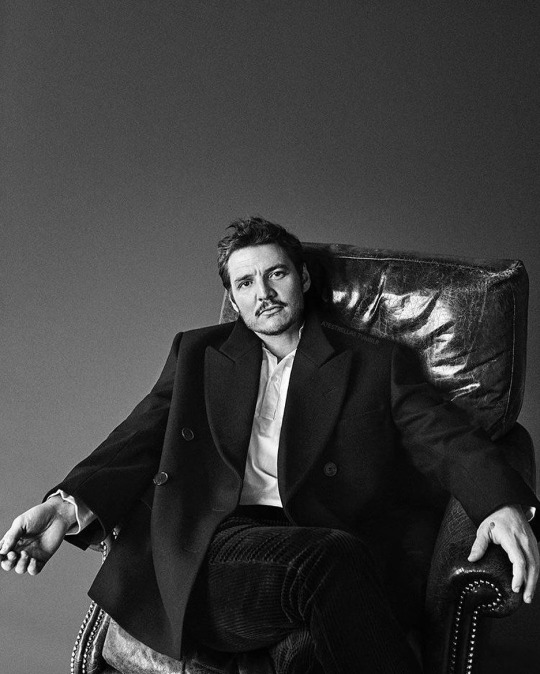
There is a distinct silence that can only be found in hyperspace when the stars outside resemble sparkling streaks of silver tinsel and your breath is trapped within your lungs as you’re awestruck by the sheer beauty of it all. You experience this silence aboard the Razor Crest, sitting in the cockpit behind Din as he pilots his beloved gunship. It isn’t the first time you’ve been a passenger, having traveled with Din on two previous ventures where your Cupid services were required on planets far away from your home on Umbriel.
Off-world assignments for you were generally rare since your bosses were more inclined to choose Cupids of higher ranking to handle those clients, but sometimes you were the only available option left. Which, come to think of it, is exactly how you became the one roped into meeting with Death every full moon. Your bosses decided someone needed to check up on him to make sure he wasn’t reaping anyone before their fated time and thus messing with the natural order of things. You privately have reached the conclusion it was a decision made during a fit of paranoia as you had yet to find any evidence suggesting Din ever broke a single one of the universe’s rules, let alone even considered the mere possibility.
When you did travel for assignments, you never stopped feeling like a goldfish being dumped out of your familiar little bowl and into a massive ocean full of strange oddities. You would often find yourself wasting time trying to successfully navigate the unknown world when you should have been focused on tracking down your client’s soulmate.
That’s why Din had offered to start traveling with you. Actually, in his own words it was because, “You think about love so much you don’t see trouble until it’s an inch in front of you. Someone’s got to be there to look after you.”
You’d tried to argue, told him you had never experienced trouble and that if you did then you could handle it with your bow. All Cupid’s were required to master archery for self-defense purposes, though Din’s responding snort of derision made you suspect he wasn’t convinced of your skills. You wondered if he thought, just as humans incorrectly did, a Cupid only used their bow to spread love and lust. Or maybe he just thought you weren’t capable of such finesse. It was an insulting assumption, fueling you with the burning desire to prove him wrong. One day, you keep telling yourself, a repetitive chant. One day you’ll show him just how capable you are with your weapon and you imagine his look of shock, whether worn openly on his face or hidden beneath the visor of his helmet, will be utterly priceless.
But in the meantime, you’re in no hurry to encounter trouble. Finding enjoyment in taking these trips with him on his ship instead.
The Razor Crest had actually been a complete surprise to you when Din first welcomed you on it; primarily because the notion of him using such a primitive form of transportation despite the powers he possessed as Death was too outrageous to wrap your head around. However, it took less than ten minutes soaring through space for you to discover just how many details of the universe you were missing by relying on your Cupid abilities to teleport yourself between locations. Never would you have imagined Death to be the one to teach you to love the slowness of travel, to let your eyes linger on all the beautiful wonders along the way. But that’s exactly what happened.
You turn your head away from the window to look at Din. From your angle, all you glimpse is the back of his helmet, reflecting the passing starlight. Soon you’ll be introducing Din to the first immortal on your list of potential soulmates.
Death, you quickly correct yourself. He’s only Din when he’s around you.
You initially thought he elected to wear his armor because you told him he could to ease his comfort, but now you think it’s because this is him meeting his potential soulmate as himself. It is easy to forget sometimes this is the image of Death—a warrior enshrouded in beskar, cunning and ruthless—that is recognized throughout the universe. And feared.
If the handsome face he concealed was known instead, you wonder if mortals would readily choose to embrace the ending of their lifetime, rather than foolishly seek to run from its inevitability.
“What is it?” Din’s baritone voice startles you as it shatters the quietness. The modulator within his helmet gives his tone a low raspiness that never fails to send a chill down your spine when you hear it.
“Huh?” You respond ineloquently.
“You’ve been staring at the back of my head for the last five minutes, angel. I figured you had something worth saying.”
“Oh, no. I was just thinking about you.”
Immediately you wish a meteor would collide with the ship, providing you with the necessary distraction to escape and find somewhere you can hide until the end of time.
“...What about me were you thinking?” Din wonders after a solid thirty seconds of pure silence, voice somehow conveying an equally blended mixture of intrigue and wariness. He flips on the ship’s autopilot and turns in his seat to pin you with his gaze, apparently unwilling to let you try and weasel yourself out of the conversation.
You roll the question around in your mind, wanting to give an answer that satisfies him without it also embarrassing yourself further.
“I was thinking how much of an enigma you are,” you murmur at last, leaning back in the chair with your arms crossing over your stomach. “You wield such incredible powers and yet you choose to wear a human face, to call this man-made ship your home and to also spend your spare time living amongst those you will eventually reap. Why are these your choices?”
He tilts his head, and you just know there is a little crease of bewilderment appearing between his eyebrows right now even if you can’t see it. For as much as he is a puzzle you can’t put together, he is also at times an open book that you will never tire of reading.
“I would think you, more than most beings, would understand the discomfort that stems from loneliness and the lengths one will go to ease it,” he says, not unkindly. He mirrors your position, maneuvering himself until he’s comfortable in his seat and totally oblivious to the dilating of your pupils as you observe every subtle shift of his armor-clad body. “Isn’t that the true purpose of Cupids? To spare individuals the ache of living a life of solitude by introducing them to someone to love so they no longer feel it.”
“That’s a poetic way of putting it,” you answer, smiling softly and shrugging your shoulders. “My superiors would just quote our mantra back at me when I used to ask. Amor vincit omnia.”
“Love conquers all.”
You shouldn’t be surprised he’s able to translate such an ancient and obscure language, but your eyes widen regardless. “That’s right.”
His voice is unusually soft when he asks, “Do you like being a Cupid?”
You stare at him, caught off guard by how easily he’s changed the topic of the conversation from himself to you. You’re used to taking orders and being thanked for your services, but no one has ever asked you if you liked doing any of it.
“I’m good at it,” you finally say, even though it’s not really an answer.
He nods his head still, as if he understands. A part of you thinks he actually does.
You lick your lips, eyeing him hesitantly. “Do you...like being Death?”
“I’m good at it,” he echoes, but your words sound somber coming from his lips.
The cockpit fills with hushed silence again, but there’s a unique tenderness unlike ever before. Minutes seem to stretch on for entire seasons as you watch one another, content to simply coexist and revel in each other’s presences.
It would be so easy to slip off his helmet and kiss him right now.
You stiffen, stunned at your own thought, but you aren’t given the chance to analyze it further as an alarm on the ship’s control panel announces with a resounding beep you’ve reached your destination.
Din spins in his seat, reclaiming control of the steering to begin the ship’s landing process. You look out the front window at the large green-blue planet drawing nearer with every anxious tick of your heartbeat.
“We’re here,” you say needlessly, forcing excitement into your voice. Fake it till you make it, isn’t that the human expression?
“Who is it we’re meeting on this backwater skug hole?” Din asks, pressing a series of buttons above his head.
You kick the back of his seat. “Be nice,” you scold when he shoots you a look. He mutters something unintelligible under his breath as he turns back around, prompting you to roll your eyes. “She’s a goddess of springtime and motherhood. The locals call her Omera.”
Tag List: @leilei-draws, @theocatkov, @becauseican2, @vintagesaph, @stardust-and-starlight, @kay2304, @odelia-d32, @adrieunor, @remmyswritings, @gallowsjoker, @rhiannon-russo, @randomness501, @eleine-t1d, @nicotinebirds, @sylphene, @softly-sad, @maytheglitter, @melobee
#the mandalorian#mandalorian x reader#din djarin x you#din djarin x reader#Din Djarin#Mandalorian#soulmate au#my fic#my writing#death and an angel#Pedro Pascal#pedro pascal character fanfiction#din x you#din x reader
394 notes
·
View notes
Text
Wreck My Daydream
Part Two
Sebastian Stan x Fanfiction
18+
Tagged🎄
@wayward-mikaelson
Cataglottism
(n.) kissing with tongue
I’m already wet and Sebastian barely even touched me.
I hardly gave myself a moment to be ashamed or even stir in the crass words I was using even if I had only thought them. Like a diary I suppose there was no need to lie to myself considering it was one hundred percent true. I, Nellie Lennox, was unabashedly met with unending desires that washed away my trepidations that led up to this moment.
In its place I felt this newfound sense of possibilities that I wasn’t actually making an ass out of myself with my sudden confession of feelings for Sebastian. In my defense I didn’t just wake up one morning after having some epiphany as to why I wanted to be with him. The thought of us together made itself at home in the back of my mind.
Almost like a what if. . .
However, I couldn’t help but be terrified of all the ways it could go wrong. What if I had made things weird between us forcing us apart? Life would be a bitter existence if Sebastian wasn’t around in some capacity. For the longest time I tried to find him in different relationships. It is a messed up philosophy, but it almost worked. Whenever things would get too serious it nearly terrified me. I was their someday and they were my maybe. I owed this last relationship that is still so freshly cut more than that.
I owed myself that.
On the unique and rare chance I somehow got lost in a very realistic maladaptive daydream, I’m pretty certain Sebastian wants this too. Just thinking about what he had told me seconds ago made my heartbeat drum to a dizzy rhythm. Imagining myself getting fucked to the beat of it was a completely different type of sensation.
Retraining my focus on the now I could see it in Sebastian’s face all the wheels going around in his head. Confusion? Uncertainty? Regret?
“You don’t get to do that.” I tell him. I felt like I was going to climb out of my own skin if he left me suspended in the silence for a second longer. Sebastian tipped his face closer to mine, our lips gingerly brushing against each other. Perhaps he was feeling ambivalent in regards of his feelings for me? After all this was sprung on him in the middle of the night.
Sebastian shook his head as if he was at war with himself. “I want to.” His voice was strained and dangerously low, like something was causing him utter misery being this close, yet not knowing exactly when to pull away.
“Then why don’t you.” I dared him.
I was growing impatient with this slow burn we had somehow started. I wanted to play with this fire. If I got burned in the end by his touch then so be it. At least I would forever be marked with a reminder of knowing that I at least went after something I wanted with no apology. I wanted to see how far he was willingly to go.
Sebastian removed his hand from the security of being wrapped around me. I feigned a disappointed sigh at the lack of contact. My entire body must have been on autopilot , because I didn’t recognize the position I was in. I practically sat in his lap with one leg wrapped around him and the other one mindlessly dangling over the bed. Of course the mind reader that Sebastian was naturally grabbed ahold of the side of my thigh and wrapped it around his back.
It wasn’t like I was naive to sex or never had my fair share of romantic conquest. Regardless of my experiences I still felt like a gigantic ball of nerves. The way he stared down at me with a heated look in his eyes as if he wanted to posses every inch of me. Hell, I felt like I could come undone from that alone.
The hand that was planted on my back slowly drifted downward trailing the curve of my backside gripping my ass through my thinly silk hunter green shorts that matched the top. Earlier I had berated myself for wearing scantly clad pajamas to bed. Now I am thanking my lucky stars I opted out of the option of wearing a red Christmas onesie that had polar bears wearing scarfs around their necks. They were ones my mother insisted the whole family wear.
If I had I probably would not have been able to feel his erection that was restrained in his sweatpants. Trying to situate myself closer I rocked into him slightly, massaging myself on him. My ears didn’t miss the subtle groan Sebastian let out from the feel of my weight pressing further into him.
His silence wasn’t lost on me and he still hadn’t answered my question so I did it again. I wanted him to say something. My nervousness abated at this point. I twined my arms around his neck, grinding myself against him again and again. All the while Sebastian watched my every movement with a hint of a star struck look in his eyes. The feeling was certainly mutual I was even shocking myself at my behavior.
“Nellie,” Sebastian finally says, voice husky. He usually only ever calls me by my nickname so I was more than sure that he was not fully himself.
“I’m a big girl Sebastian I can handle whatever you need to say.” I tell him, holding in my breath.
“Alright,” he said with uncertainty. “You and me, this, it’s not a good idea.” His tone was barely audible and even more so he sounded hurt. Everything in me froze.
“And why is that?” I asked him more confused than ever. Suddenly feeling absolutely self conscious as I over analyzed every intimate word I just shared with him. I was even more horrified by the fact that I was dry humping my best friend.
He let out a darkly laugh. “It’s pretty damn obvious Nells.” Sebastian says rather ominously.
“...It’s not actually.” For someone that wants nothing out of this, Sebastian was holding on to me like an anchor and I on the other hand just wanted to get away and sink.
Admittedly, I was losing this game of tug a war. There was only so much I was willing to endure even I had my limits. “You’re giving me whiplash Sebastian .” I tell him honestly, “ I’m not like those other girls you go for that are satisfied with you just dangling yourself in front of them like a piece of cake that I can’t have. I meant what I said when I told you I didn’t say it just to hear you say the same.” My voice could only rise so high in pitch.
I definitely didn’t want to wake up the upstairs guest that would love nothing more than to recap this conversation over breakfast. Then like an unexpected bolt of lighting startling you from a distance, Sebastian kissed me.
Sebastian
I am a selfish bastard.
My mind fell quiet when I looked at her. I wanted to swim in the serenity and peacefulness that was this smart, vibrant, sexy, and uniqueness this woman possessed. I only wondered even in the darkness could Nellie see my eyes as plainly as I can see hers. If so could she see the shame reflecting in them? I could feel the nagging weight of my conscience siting on both of my shoulders, arguing back and forth over what I should and shouldn’t do. It was kind of ironic that the devil in my ear insisted that I give in to the angel in my lap.
God knows I waited for her and that I would keep waiting if I had to in this lifetime or the next. It was always going to be Nellie for me. I wanted to tell her all of this, but the longer I held on to this slice of heaven I was given during this random hour. I also knew that this moment was fleeting. I basked in the way she looked at me, the way she held on to me like I was an object of virtue. I also got a sample of what it would be like to lose her the second she began to slip away on her own accord. So, I did what any poor fool would do in my position. I kissed her.
It wasn’t exactly suave or how I imagined it would go. My mouth sort of crushed against her unmoving lips in a rushed and unskilled manner. Frankly, I wasn’t sure what I was doing, I certainly could do a hell of a lot better than this. An yet, it was still like I predicted it would be, filled with pure unadulterated pleasure. Nellie’s lips were sweet and warm, exactly how I imagined forbidden fruit to taste like.
A perfect mixture of firm and softness that drove me wild. She flattened her hands on my bare chest as if to brace herself. Nellie pushed herself away, but her face was still so close to me. She didn’t speak and neither could I. I forced myself to look up at her and hoped that she could see I would do everything in my power to earn her forgiveness. That it was a mistake I will make right somehow.
“Nell,” I let out an exasperated breath. “ I have a need for you that goes deeper than just lust and I know that it will never truly be sated. The killer thing is I’m already at risk of losing you before I even had you.”
Nellie stared hazily up at me.“You already have me.” She whispered, our lips still grazing. Those four simple words set off a firework in me. This time when I kissed her our mouths came together like we needed to feed off of each other’s oxygen in order to survive. I’d suffer if I didn’t have it.
My mouth was greedy for hers, and I could imagine she felt the same. The moment I felt her lips slightly part open to let me in, less than a second our tongues slid together in a torrid and sensually slow pace. We kissed like a couple of eager teenagers. My heart threatened to leap from my chest when the tip of Nell’s tongue moved across my bottom lip. She tastes like gingerbread , mixed with some other divine flavor that I can only assume is Nellie. She arched herself closer into my chest and I could feel the points of her hardened nipples through her top. I seized the opportunity to press her body close because I needed more.
I wanted to feel the heat of her soft skin on mine. She returned her arms back around my neck tightly holding me in place as she angled her head kissing me back with the same ferocity. Deeply, and oh so thoroughly by the way she sucked on my tongue. I had a rough grip on her ass keeping Nellie steady as she straddled me. I was so damn hard for her. If my dick could get even harder it was bound to. Nellie did that thing again where she grinds down on my erection and I cursed at myself to not combust. I grabbed ahold of her hips guiding her to move faster, harder.
I kept telling myself to savor her, fucking take my time with this moment. I couldn’t just rip those tiny little shorts off and sink myself into her over and over until we’ve both had enough. But even then I would always need more of her. I wasn't a sentimental man, with Nellie I at least wanted to try. I wanted my first night with Nell to be a little less spontaneous than this. It wasn’t like I came prepared for festivities filled with endless fucks. Plus the added fact I couldn’t let things get too carried away especially since she still didn’t know what I have done.
Yeah, I am a very selfish bastard.
I didn’t want this to end. I wanted my mouth to explore every single part of Nellie. I wanted the taste of her to live on my tongue. I wanted to go as far as she and my consciousness would allow me.
“I need to touch you.” I panted, between every nip and kiss I left on the delicate area of skin under her jaw.
“You’re already touching me.” She says with a soft laugh, which was a melody to my ears. I was but at the same time I wasn’t. I needed to rid Nellie of any barrier that prevented me from branding her skin with my touch.
“This…off.” I tug gently on the bottom of her tank top before returning my hands to rest on her thighs, caressing them as I sucked on her neck for dear life. Going back and forth between grazing her neck with my teeth then licking over the area to soothe any imprint I’ve left.
Nellie crisscrossed her arms reaching for the hem of her top gracefully pulling it over her head. She purposely fell backwards onto the mattress aiming her shirt at my face. For as long as I’ve known Nell she was never one to be shy in her own skin.
“Imagine how unsexy that would have been if I hit my head on the headboard.”
“As long as you didn’t hurt yourself I would have just pretended that I didn’t see a thing.” I teased.
“Ah, to think they wonder where all of the good men have gone.” Nell scrunched up her nose pretending to be lost in critical thought.
I cock my head to the side. “Mm-hmm. Are you mocking me?”
“What if I am?”Her plump wet lips spread into a smile.
It was miracle I caught a word of what she said to me. I swallowed a groan as my eyes drift over the area of her body that was naked from the waist up. Nellie was clearly a stolen painting from the Louvre that I had no intention of returning. All I could do was stare.
With her legs still draped around me, my hands slide up the curve of her torso passing her ribs. I sensed that she was watching me, but I didn’t dare take my eyes off of her just yet. The pads of my fingers traced over to her breast and my mouth practically watered at the sight of them. She was ethereal.
“Don’t suddenly go mute on me Sebastian.” She let out a shaky breath.
I’ve heard her say my name a thousand times. Hearing her say it in this state created a feeling of warmth that filled my chest. I could only begin to imagine the different ways I wanted to hear her call out my name. My gift, my best friend, my Nellie. Those last words had a sting to them even as I thought them. Deep down I knew that was never going to be true.
I eased all the way down my tongue traveling around the dip of her navel. Creating a path up the center of her abdomen. I knew that Nell was extremely ticklish. The slightest form of contact would automatically turn her into a ninja. From the way she was pressing herself back into the mattress I knew she was trying her hardest not to flee. Of course I found it rather enticing so I made sure to spend extra time over the areas of her exposed skin I knew to be the most sensitive. Brushing the tip of my nose between her breast my mouth finally latched on to what I’ve been waiting for.
“So fucking beautiful.” I say as I graze my mouth over the stiff peak of her nipple. I was in awe over the ability that they simultaneously could feel hard yet felt extremely soft. I dragged the tip of my tongue around the bud of it in a languid movement before sucking it in deep. I loved listening to the sounds she made while I sucked and devoured as much as I could fit into my mouth. I wanted to hear a symphony of the noises that escaped from Nellie.
Going for one after the other not wanting to miss out on either. Nellie kept a limp hand pressed into my hair keeping me close as if I dared to stop.
Writhing underneath me Nellie gasped,“Touch me.”
Now she understood what I meant. My own body felt betrayed by my decision. I literally ached from pain and pleasure. Truthfully I wouldn’t opt for a better scenario than this. I would be more than gratified with giving Nellie an orgasm or two.
Still leaving featherlight kisses across her chest. With one hand I reach down and brushed along the dip of Nellie’s hip, then began to tug away at her shorts. To my surprise she was bare underneath. This was a new and uncharted territory we were crossing.
Tell me to stop, say that this is just the wrong time, tell me we would never work. Those words never escaped me, the sound of the goddamn doorbell intervened for her. My movements hesitated then shortly I picked up on inaudible chattering out in the hall. Nellie turned her head in the direction towards the door which I hoped like hell was locked. “Maybe we should go see what’s going on.” Her eyes widened.
“Or we could stay here and not shame the fact that I was two seconds away from wrapping your legs around my face while I tasted the slickness between your thighs. ” Nellie released a ragged breath and I meant every word.
To my dissatisfaction we were composed in under three minutes. I felt a strange sense of comfort and pride seeing that ever so often I’d catch Nellie looking in my direction smiling like she had some big secret she was bursting to tell. Which only made me feel like an even bigger asshole. The walk downstairs was surprisingly noisy. Someone had plugged the Christmas tree back up and there was a chilly wind breaking in as the front door came to an immediate shut.
Nellie’s parents were both moving around in a fast pace trying to find new spots to put a couple of suitcases. I had to swallow down a chuckle at the sight of their bold choice of pajamas. Nellie had already beaten me to the bottom of the staircase just as I rounded the corner of the spiral stairs.
“Cousin!” Vanessa squealed rushing over towards Nellie, who excitedly embraced her the same. They exchanged a few excitable words to each other that I tuned out. I was busy focusing on the six foot son of a bitch with a puppy dog expression on his face standing awkwardly behind them.
“Now you know Nells Bells you can’t have Christmas without good ole St. Nicholas can you?” She winked at a stone faced Nellie who just looked straight ahead at her ex boyfriend Nick. “I hope it’s okay I brought him over with me. I saw him at the airport dozed off in a chair.” Vanessa whispered as she leaned into Nell, like she just earned a gold star. Soon as Vanessa’s wild dark brown eyes caught ahold me I knew my bubble was about to pop.
“Something told me I was off the naughty list this year.” Vanessa bit at her glossed up lips and made a beeline towards me, wrapping her arms around my waist. She smelled like an overtly sweet perfume that tortured my sinuses. “Did you forget how to work a phone or what? I’ve been trying to get ahold of you for days. I miss you.” She cooed.
Out of the corner of my eye I saw Nellie watching the two of us. This was my punishment.
#sebastian stan#sebastian stan imagine#bucky barnes imagine#sebastian stan fanfiction#sebastian x reader#marvel imagine#sebbytrash#sebby stan#bucky fandom#marvel smut#mcu smut#bucky barnes smut#sebastian stan smut#sebastian smut#mcu fanfiction#fanfic#sebastian stan fic#sebbybarnes#sebastian fluff#sebastian stan fandom#bucky fic#fic#sebastian stan story#sebastian stan one shot#Sebastian Stan fluff#sebastian oneshot
88 notes
·
View notes
Text
Jack Vessalius as a Symbol for Depression
Ever since I first read PandoraHearts, I have interpreted Jack Vessalius as at least a partial symbolic representation of depression, especially in his relationship with Oz.
(Skip to “keep reading” to go straight to the analysis; this beginning portion is little more than a disclaimer.)
Jack is a complex, fascinating character, and it is precisely due to this that I believe any number of interpretations regarding him contain merit. Whether you view Jack as an abuser, a manifestation of mental illness, or an extraordinarily-written character that does not require a figurative understanding to be interesting, I think this is valid.
I am saying this first and foremost because I want to be clear: this is not a persuasive essay. I am not trying to change anybody’s minds about liking or disliking Jack Vessalius, nor am I trying to devalue any other interpretations of this extremely nuanced character. Some points may be a bit vague and connections disjointed, though I attempted to minimize this. Any discussion of mental illness and abuse is based on either my personal experiences or those of people I know. I do not intend to offend anybody.
This post is simply the product of years of disorganized yet in-depth thoughts about this concept. I hope some of you will be interested.
Major spoilers for the entire manga below the cut. Manga panels are from the Fallen Syndicate fan translation. This...is going to get very long.
Emotional Abuse
Jack exists within Oz’s mind. When these two interact, it almost always occurs within Oz’s head, providing every conversation with an inherently emotional and symbolic element.
Jack initially appears to Oz as an unknown but crucial figure. Whether he is trustworthy or even harmful remains to be seen, but his input is necessary. He is the only insight Oz has into his lost memories; he knows something Oz does not. Oz is suffering an identity crisis, realizing he has endured something he does not completely understand, something that could potentially change his entire life once he does understand it. And yet, this mysterious voice within his head understands it.
This desperation makes it almost irrelevant whether Jack is credible, whether his advice is well-intentioned. Normally a rather cynical and distrusting young man, Oz follows Jack from the beginning despite wanting answers. He does indeed receive answers, but they are perhaps not quite what he bargained for, in more ways than one.
Once Jack’s true nature is revealed, the extent to which he has used Oz’s memories and emotions against him becomes apparent. Jack does present Oz with new insights into his experiences, but he only ever provides Oz with enough information to convince him to act a certain way. He never willingly gives a fair, all-encompassing portrayal of an event from Oz’s past. He manipulates Oz’s perceptions of his memories to fit a particular emotional narrative, one that is inevitably perplexing and demeaning to Oz.
This bears a resemblance to the way depression warps how we view past events. When we look back at our experiences, we don’t see the entire picture--though we are convinced that we may. We see a skewed version of an incident that actually occurred. Perhaps this incident proves little to nothing about ourselves in reality, but viewed through the lens of depression, everything about it seems to scream that we are useless. And it is nearly impossible to try and perceive these events any differently, because when depression overtakes our minds, this perspective appears to be the only one through which it is possible to examine any of our pasts.
By the time Jack’s intentions have been exposed, he is also explicitly emotionally abusive towards Oz. It is easy to recognize Jack’s statements as not only psychologically damaging, but disturbingly similar to what we hear in our own heads when suffering depression. Think about these assertions without the very literal plot elements that support them: Jack declares Oz less than human, insists that nobody loves him, and claims that he has no future because the only thing he’s good for is hurting those around him. He convinces Oz that he is useless, hopeless, and worthless.
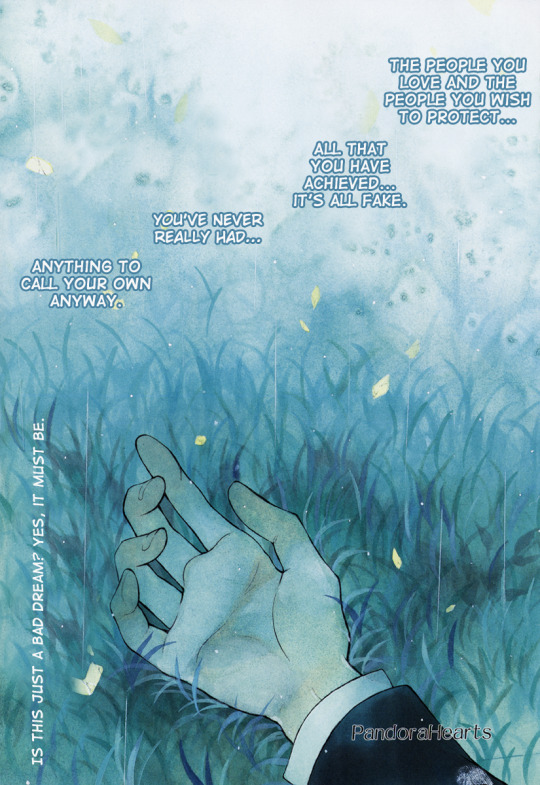
Jack drills these ideas into Oz’s head when he is at his most vulnerable. This is when Oz breaks down and becomes convinced that all of Jack’s statements are true. He is not who he thought he was; he never has been, and so his life is meaningless.
This is arguably when Oz reaches his all-time emotional low. While it was already addressed that he had been struggling intensely with his mental health and was probably suicidal, up to this point, he always retained some level of self-preservation (however slight). Now, he silently accepts that the world would be better off without him and offers no physical or emotional resistance to his own execution. Jack’s words worm their way into his heart and corrupt his self-image to the point where his only reaction to Oswald’s sword swinging towards him is a blank, unflinching stare.

Trauma Response
It’s not uncommon for Jack to manifest during catastrophic moments--that is, whenever a situation triggers (or comes close to triggering) overwhelming memories of Oz’s trauma. When Oz is losing control over his emotional and physical faculties, Jack often encourages him to make the trigger disappear using the quickest and easiest method available. Unsurprisingly, this method generally takes advantage of Oz’s extraordinary powers. In other words, the “tactic” Jack advises Oz to use is simply mindless destruction.
In the second half of the manga, Oz is at his least emotionally stable. It is not a coincidence that this is also the point during which Jack gains the ability to completely hijack Oz’s body. This development allows Jack to commit impulsive acts of aggression through Oz, while Oz himself retains little to no control.
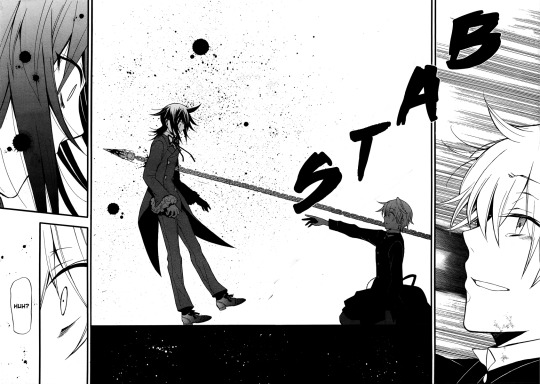
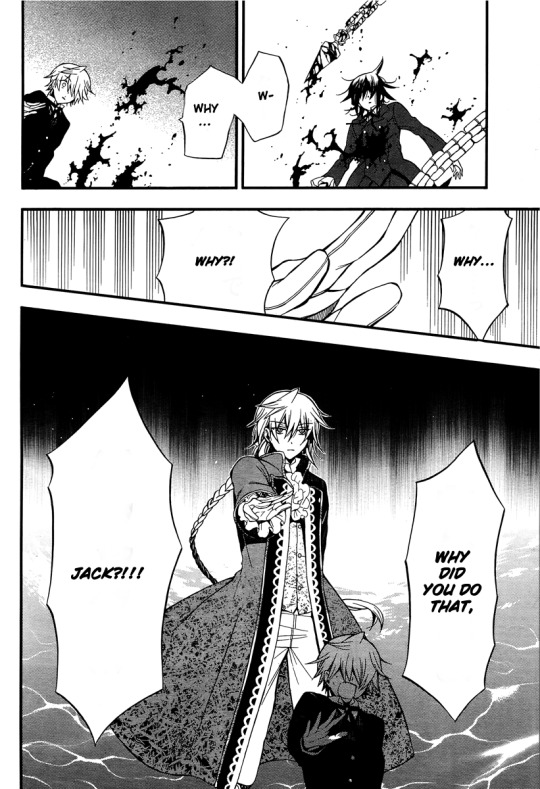
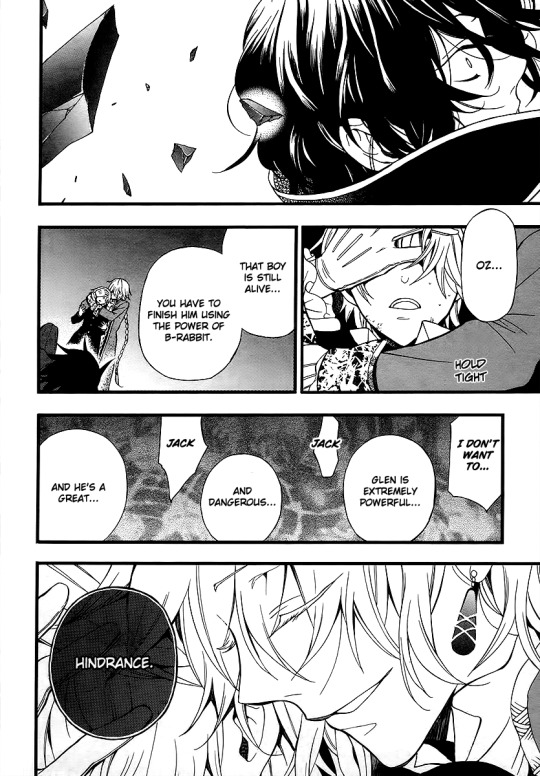
Jack overwhelms Oz with unnecessary flashbacks to traumatic events and makes an excess of harmful connections between past and present circumstances. Oz’s panicked, distressed responses to this are tools he uses to further coax Oz into acting in a self-destructive manner. These tendencies may not only connect Jack to the concept of depression, but the concept of post-traumatic stress disorder as well.
Identity Crisis
Although Jack is introduced extremely early in the manga, one of the story’s main mysteries is the exact nature of his connection to Oz. This relationship shifts several times, especially with regards to who is “in control” and who is the true “owner” of the physical body.
Once it becomes public knowledge that Jack is “within” Oz, the identity of the former overcomes the identity of the latter in the eyes of the general populace. Figures who never before gave Oz a second glance begin to pay incredibly close attention to him; many directly address him through his connection to Jack rather than as a separate entity.
Oz is deeply troubled by the way others ignore him in favor of an aspect of his identity that he feels does not truly represent him--an aspect of his identity that is at least partially out of his control. However, he is also relatively resigned to being judged in this manner. He lacks knowledge of how to change this circumstance because even he does not truly understand the extent to which he and Jack are connected.
It is true that at this point in the story, Jack is practically worshipped. His destructive actions and devastatingly selfish nature have not yet been exposed. Because of this, Oz as Jack’s “vessel” is typically viewed through a positive lens. Still, this situation reflects how people with depression are sometimes reduced to nothing more than a mental illness by their peers. Because others do not understand (and mental illness is stigmatized), they start to see us as “different” in some indefinable but undeniable way, and our existence becomes that particular part of ourselves in their eyes.
As time passes, the line between Jack and Oz becomes more and more blurred. Questions are raised about whether they are the same person or, on the contrary, whether they are similar at all. At what is arguably the climax of the manga, Jack declares that Oz’s body is, was, and will always be his possession; he claims that in reality, there is no “Oz,” only “Jack.”
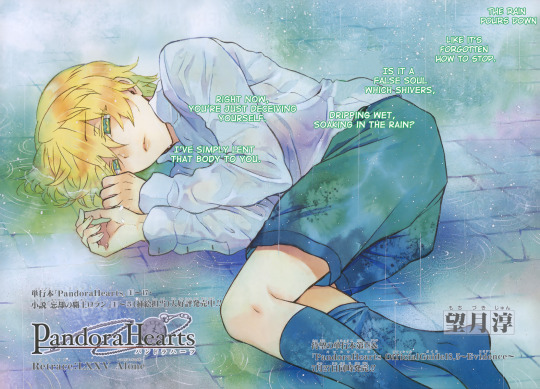
This thought haunts Oz intensely and sends him into a rapid downward spiral. Like the sentiments expressed near the end of the “emotional abuse” section of this analysis, the idea that Oz’s body belongs to Jack is backed up by rigid, literal plot elements. However, if we view this emotional catastrophe using a symbolic perspective, it is a representation of yet another common struggle endured by those with depression.
We come to ask ourselves who we really are. Was there truly a time when we weren’t “like this?” Could we truly escape this misery in the future? Who would we be if we were to stop feeling this way? Do we even exist without depression? Does Oz even exist without Jack?
Visual Symbolism
It is a classic literary device to represent hope through light and despair through darkness. The manga is rife with this exact type of symbolism, utilizing it to describe how the Abyss has changed throughout time, Break’s dwindling eyesight, and the oscillating emotional states of various characters.
As I stated previously, Jack and Oz interact almost exclusively within the latter’s mind. The landscape drawn in the background of these conversations initially possesses a watery, clear appearance. However, as it becomes increasingly clear that Jack’s presence is deeply damaging to Oz’s psyche, this same landscape becomes overwhelmingly tainted by dark, ink-like shadows.
Closer examination reveals that this “pollution” originates directly from Jack--and it reaches its peak once Jack’s intentions have been fully disclosed. Not only is Oz’s mind visibly corrupted by darkness, but Jack himself appears as an almost inhuman figure composed of these shadows.
There is another level of visual symbolism as well--namely, the fact that Jack becomes increasingly physically aggressive and disrespectful towards Oz. In the first half of the manga, he primarily speaks to Oz from a distance, occasionally reaching out a hand in his direction. This is clearly not so in the second half of the manga, at which point Oz begins to defy his influence and it becomes vital that he subjugate him as quickly as possible.
By this time, Jack is almost always seen either restraining or caressing Oz. Even in the latter situation, when his touches are lingering and vaguely affectionate, they are possessive and constraining. In other words, though they appear different on the surface, both actions are ultimately methods of forcing Oz’s submission. It can be said that this represents his desire to gain complete control over all aspects of Oz’s being, as well as his total lack of respect for Oz’s physical and emotional autonomy.
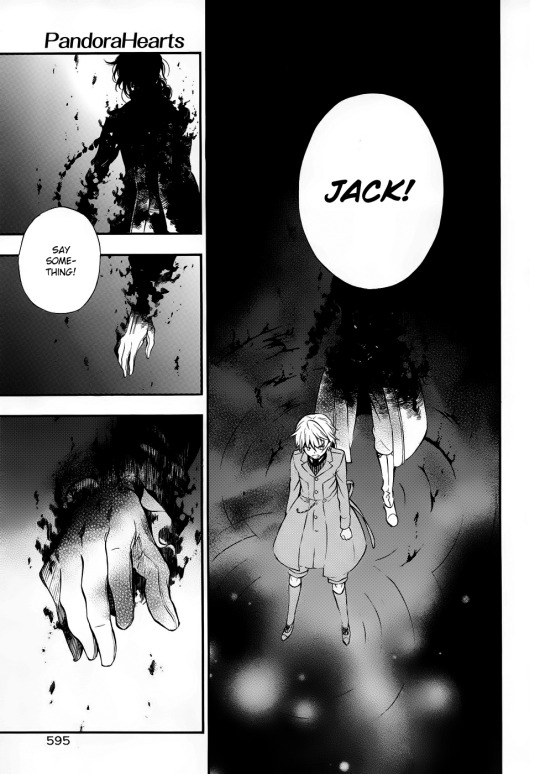
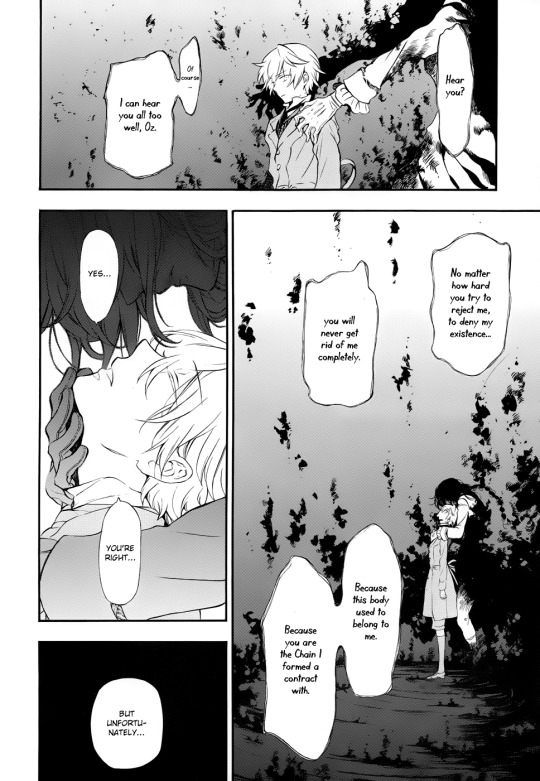
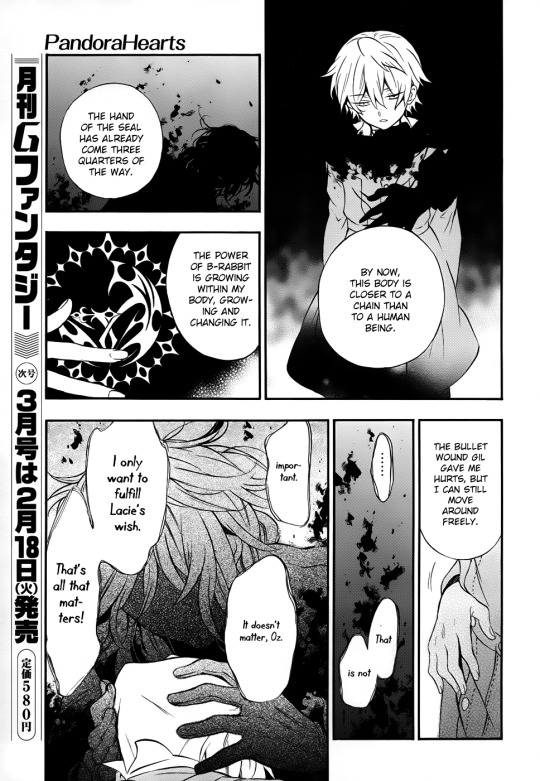
It can be argued that both of these aspects of symbolism reach their pinnacle even before this point. Oz realizes his own worth when Oscar says he loves him and reveals that his greatest desire is for him to be happy. When Oz is at last able to grasp that he is loved and there is hope within his life, Jack immediately reaches out to grab him. And in one of the manga’s subtlest but most poignant moments, his hand crumbles to dust upon touching Oz.
What follows is an extremely impactful display of Oz’s character development. He recalls Jack’s previous statements declaring his achievements worthless, denouncing the love he received from others as fake, and degrading his worth. Then he furiously rejects all of them, thrusting out a hand to push Jack away from him and consuming Jack in an explosion of light.
The conclusion to be drawn from this is that Jack essentially lives off Oz’s misery. When Oz understands and is able to accept that he is not worthless, Jack is suddenly rendered utterly powerless.
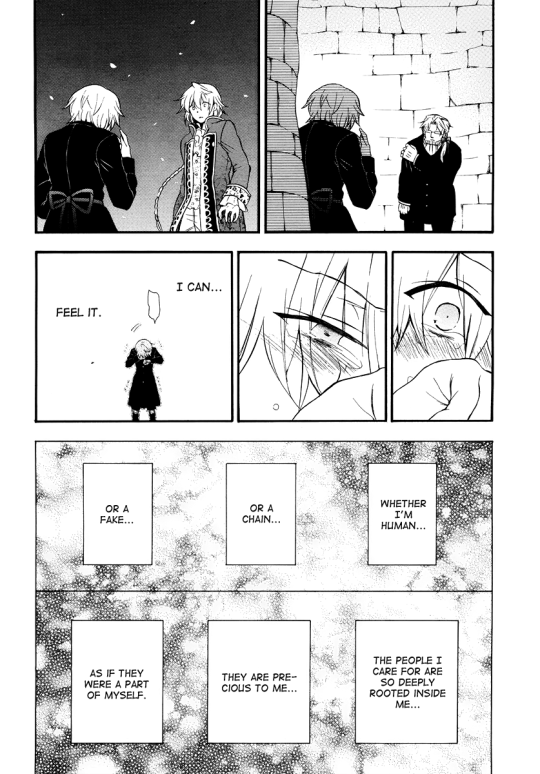
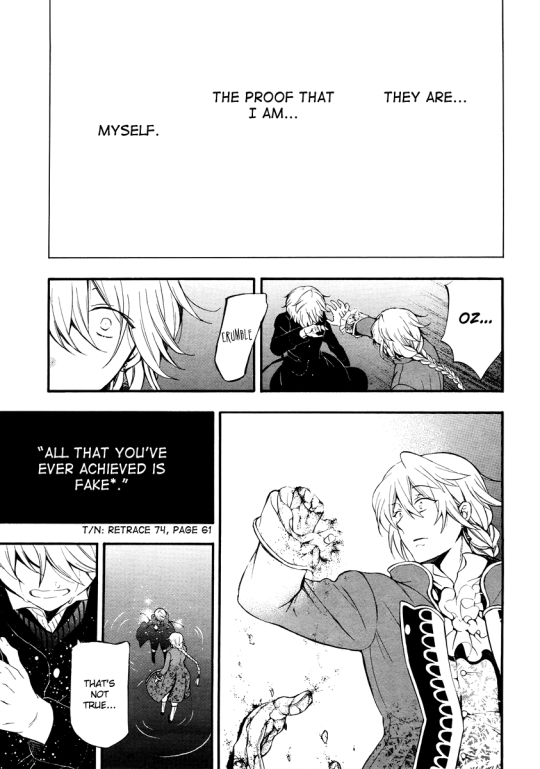
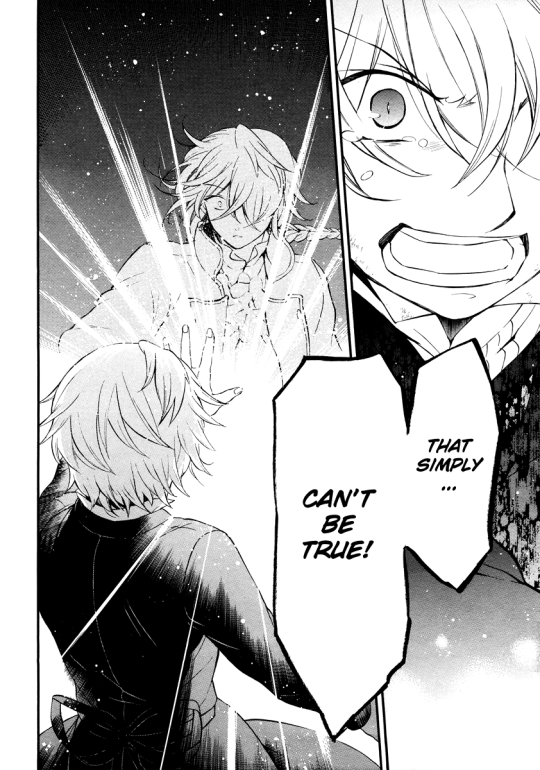
The manga culminates in a scene that coincides with this symbolism. This late into the story, Oz has succeeded in transcending Jack’s influence almost entirely, but Jack is not quite ready to let go. Though they stand together within a void, glimmers of light linger around Oz--despite everything, his life has come to be surrounded by hope and love.
As Oz floats towards the path of light above, Jack reaches out and takes hold of his wrist. But his grip is feeble and hesitant, representing how little control he truly holds over Oz at this point. Perhaps attempting to provoke guilt or regret, Jack asks Oz if he is certain that he is prepared to move on without him, but Oz has grown too much to succumb to this manipulation.
Without delay, Oz replies that there is no reason for him to stay, and Jack finally releases him. He escapes into the light--into a world full of people who care about him, into a life where he is happy to be alive.
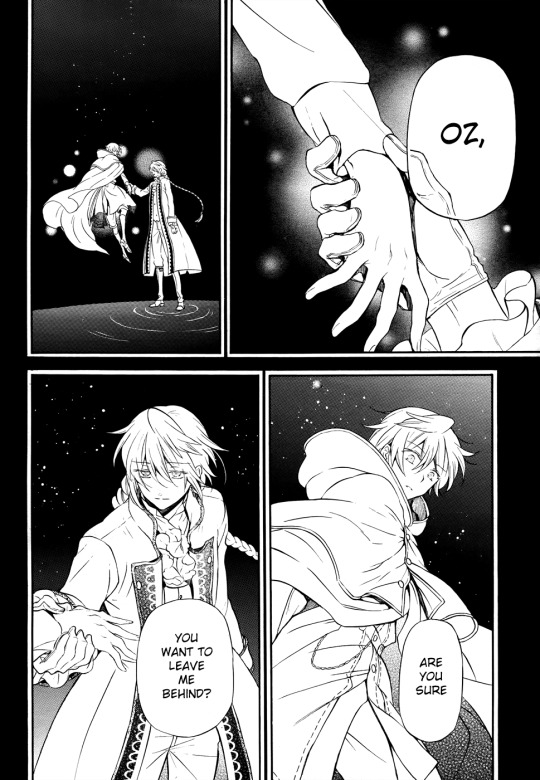
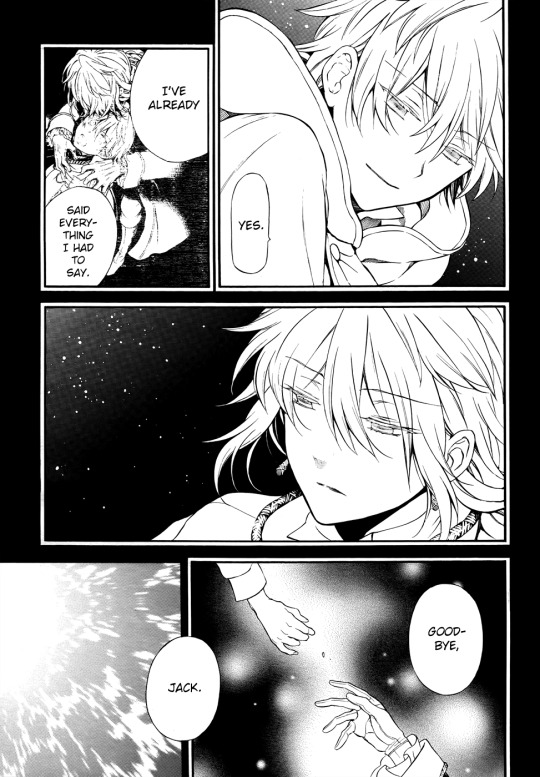
#PandoraHearts#Pandora Hearts#Jack Vessalius#character analysis#Oz Vessalius#analysis#Cyokie's thoughts
150 notes
·
View notes
Text
Kizuna drama CD: Detail spotting and nuance analysis
02 involved displaying its group dynamic through mundane interactions and wacky hijinks, and the circumstances of an eight-year block of time between Kizuna and 02, plus the fact that Hikari and Takeru operate separately from the others due to the movie’s circumstances, mean that the drama CD centering around the group is actually our most reliable source of info regarding how they’re doing at this time and how their group dynamic is going. Much like 02 itself, getting a lot of this nuance requires reading between the lines, so let’s take a closer look!
Since this is a drama CD and not animated material, I’ll be going through this in bullet points instead of screenshots.
The fact that the drama CD itself deliberately uses the same format as a 02 episode carries a very strong implication that, unlike their seniors who are going through an existential crisis about how much of their childhood experiences they can bring with them into adulthood, the 02 group is still roughly able to recreate the same atmosphere they had eight years ago. Noticeably, the ending song chosen for this is the first ED (Tomorrow My Wind Will Blow), the more lighthearted one used for the first half, before a lot of really emotionally vicious things started happening to them.
The phrase “it’s been a while” and variants thereof come up between this group a lot within this drama CD (and once in the movie itself, from Hawkmon to the others). Look closely at the circumstances of this drama CD and how everyone seems to be very intimately aware of each other’s situations, and the fact that this story obviously takes place only a short time before the movie itself -- so it really hasn’t been a very long time at all, but apparently even that much is considered a “long time” for them. (It also seems like they’re going out of their way to make sure they’re still keeping in regular contact even when they can’t actually meet up.)
Daisuke says, very clearly, that Iori was the one he intended to approach “first” because he was so busy -- but he’s shown walking in with Takeru, meaning that the two of them are on very good terms now and seem to have been hanging out independently.
Daisuke wanted his plan to be a “surprise” reveal to the others, and the actual practical purpose of his plan (it being a career study trip for him) seems to have been very low on the priority list to the point it takes the CD’s entire half-hour runtime for him to finally bring it up. Before then, he’d been cheerfully fantasizing about all the fun things he’d get to do with them, and it even says a lot that he’d also wanted to discuss this at a karaoke bar of all things, so, really, in his head, “hanging out with friends and having fun with them” is the actual priority (especially since there’s basically no reason he needs to have the others on his ramen research trip, he just wants them there because he does).
The fact that the boys have to sneak in the Digimon to avoid getting extra charges means that society will now recognize them as patrons to be regularly charged.
Daisuke is asked by Iori which people he intends to bring to his trip, which implies that the 02 group isn’t technically an exclusive club or anything...but then Daisuke proceeds to list off the 02 group by name, implying that this group does indeed have a particularly elevated level of importance to him.
Look carefully at the nuances surrounding whom Daisuke wants to invite to his trip: he wanted to invite the seniors as well, but resigned himself to the fact it’d probably be impossible because they were too busy...only for the others to point out that the rest of the 02 group is also busy, but everyone is confident that they’ll make it work, and Daisuke wants them there to the point of listing them by name. So in other words, Daisuke likes everyone and would like everyone around in the ideal situation, but when push comes to shove, the rest of the 02 group is whom he really wants to have around, and said group can be reliably counted on to do whatever it takes to make it work.
The way everyone casually describes each other's circumstances (and in specific detail, not just generally describing what they're up to) says a lot; Armadimon's still talking with Hawkmon about Miyako (meaning Miyako and Iori are still regularly in contact), Takeru's up-to-date with Ken's life to the point of knowing his upcoming schedule, Daisuke's fully aware of how busy Iori is, and, later, the one to affectionately greet Hawkmon is none other than Wormmon, who, back in 02, used to only really be close with Ken himself and V-mon. You can see that everyone’s still constantly involved in each other’s lives, including their own partners being up-to-date on each other (compare the more distant relationship their seniors are portrayed with in the movie itself, both with each other and with their partners), and you can also see that Ken and Wormmon have fully integrated themselves into the group to the point it’s a completely casual affair (Iori, the one who infamously had the longest and most drawn-out process in accepting Ken, is the one to personally ask him about his preferences).
That said, note that Takeru and Iori still seem to be on surname basis with Ken, even despite obviously being much closer with him than they were before; unfortunately, it seems that having been on surname basis with him so long in 02 became a habit, leaving Daisuke and Miyako as the only ones currently known to have switched to given name basis with him.
It’s interesting that Ken, not Daisuke, is the one explicitly stated to be keeping up with soccer to the point of having schedule commitments, whereas no mention of this whatsoever is made with Daisuke, and it’s entirely possible that Daisuke actually quit playing it in an organized fashion. This is, however, consistent with their personalities, in that Ken would likely want to keep up with organized extracurricular hobbies, whereas Daisuke may enjoy soccer as a hobby, but not enough to continue committing to a high-level team. (Remember that Daisuke took a while to get a regular position even back in elementary school; as much as he liked the sport, he also wasn’t particularly outstanding at it, and especially not in comparison to Taichi, Sora, or Ken.)
Miyako leaving for Spain seems to have been a recent thing, since it has to actively be brought up in conversation as a reminder (and Daisuke seemed to initially have not taken into account that she wouldn’t be easily able to join the trip in that case, since the issue of the D-3 hadn’t come up yet). When she shows up later in person, everyone’s shocked, as if it’s unnerving for her to be back in Japan already.
Daisuke still seems to have a thing for Hikari, but note that this doesn’t really go beyond “wanting to hang out with Hikari a lot”. Also, he says this in plain view of Takeru without bringing him up at all, and Takeru himself has nothing to say about it (not even awkward laughter), meaning that he really has no object in this whatsoever.
It’s interesting to see that Armadimon, who used to have to ask about how human society works quite often in 02, is now well-versed enough in Japanese culture to be really passionate about it.
As usual, Iori does not mince words (when it's about Nagoya specialty food, at least).
Also as usual, Ken is surprisingly academic about his interests and a huge nerd.
Note Takeru's awkward "I don't really want to insult you, but also, that's weird" reaction to Ken’s speech about the hot springs -- very classic Takeru, not quite being honest for the sake of keeping the peace and awkwardly trying to be nice about it -- in contrast to Daisuke, who just honestly goes straight for the commentary. That said, regardless of how unusual of a hobby everyone around him clearly finds it, note how they all still decide to accommodate it anyway and support his interest in it.
Hypocritically, V-mon calls Daisuke out for being “embarrassing” regarding his fixation on Hikari, only to suddenly get caught off-guard by Tailmon shortly after...
Hikari's behavior has the most clear-cut contrast from herself in 02, consisting of her very assertively stating what she wants, for herself -- very important because her problems in 02 revolved around her compulsively being unable to voice her own thoughts if it meant putting a burden on others. Here, Hikari gets argumentative about what she, personally, wants to do. Given that she doesn’t quite act like this in front of her seniors in the course of the movie, and is depicted as being particularly in-sync with Miyako here -- and given how Miyako was instrumental in reaching out to her during the events of 02 -- it’s pretty easy to see how Hikari became able to assert herself like this.
Similarly, much like how Tailmon was portrayed as lightening up a bit between Adventure and 02 thanks to her new, happier life, here, she seems to be exactly on the same page as Hikari in terms of wanting to fight people for something materialistic.
Hawkmon says that it's "only natural" for them to show up whenever this group is getting together, and, indeed, Miyako was technically uninvited because everyone thought she was busy in Spain -- but was clearly in contact with them (or at least Hikari) to know that this meeting was happening. (There’s probably a group chat.)
This is implied to be the first time the 02 group has seriously considered using D-3 gate exploitation to visit each other and to travel. The group had already made use of this exploitation during 02 itself (to have Palmon delivered to New York back in 02 episode 38 and to meet up in the Digital World), but it is true that they hadn’t been necessarily using it even when it arguably would be more convenient than Tokyo transportation and Imperialdramon. So in other words, for the last eight years, through all the meetups they seem to have been having with each other (and remember, Ken lived in Tamachi, not Odaiba, at the time of 02, and there’s no guarantee that nobody in the Odaiba neighborhood didn’t move at some point), they were perfectly fine with using the inconvenience of Tokyo transportation to meet each other, or to meet up in the Digital World instead -- but then Miyako found herself in another country, and decided that she wasn't going to stand for being separated from the others for too long.
As usual, Hawkmon still has to be Miyako’s concerned minder when she’s on the verge of going out of control.
Miyako had already been implied to be in Barcelona thanks to the scenery outside her window and the movie end credits, but her speech about Spain drives it in even further with the Gaudí references.
Despite Spain being possibly the one of the worst possible options for what's later revealed to be Daisuke's motive for this trip (ramen research), it seems that Miyako baiting him with mention of the soccer league was enough to get him momentarily distracted (and also indicates that Daisuke still clearly has an active interest in soccer even if he may not be regularly playing anymore).
Speaking of which, it’s pretty obvious that Miyako knew exactly what to bait Daisuke with in order to do this.
Takeru, the group's resident moderator, is of course the one to step in and prevent Tailmon and Armadimon from wreaking too much havoc (Daisuke is mostly just slightly intimidated) -- but you might also notice that he's otherwise not saying anything about the group's chaotic antics, and in fact is guilty of enabling them even further...
Daisuke continues to have his penchant for pointing out the elephant in the room -- he's exactly right, how is Wormmon supposed to put on skis?
It is, of course, only natural that Miyako would be sensitive to knowing about currency exchange and the use of American dollars in the Digital World, given that she presumably hasn't forgotten the Digitamamon incident from 02 episode 14.
For the first time in 19 real-life years, we finally learn what Daisuke’s original motive for wanting to get into ramen making was: in true Daisuke fashion, he himself has no idea (but he just really likes ramen).
Daisuke "credits" his friends for giving him insightful advice and helpful resources in thinking about his career and future plans, but, as it turns out, everyone else wasn't thinking nearly as much of it -- either they hardly remember it, or it wasn't actually supposed to mean anything insightful. It's obviously not to say that they're not fully supportive of him (the events of this drama CD blatantly indicate otherwise), but rather that Daisuke attributes everything important and helpful in his life to his friends to ridiculous degrees, even when it's something completely ordinary like a train ticket that anyone should know about.
As always, Daisuke is very realistically aware of his own limitations, admitting freely that he was actually lacking in experience and insight to follow his dream (especially since he took the "advice" from his friends very, very seriously).
Note how quickly everyone changes their tune and immediately decides to unequivocally support Daisuke the moment they realize there's actually a very important reason to him that he wants to go on this trip.
Also note that when Hikari compliments Daisuke, Daisuke is completely at a loss -- yet again, Daisuke's been so busy rolling around for Hikari's approval that he hasn't accounted for what to do when he actually gets it.
Daisuke picking New York, of all locations, as his stop to research ramen certainly explains why Ken has to ask "why ramen?" during the movie itself -- as this drama CD indicates, and as per the events of 02 episode 50, he absolutely knows why Daisuke would want to get ramen, but ramen in New York, which isn't exactly the cultural center of ramen making, is a different story.
The fact that this was a planned multi-day trip also explains why the group changes clothes and is in New York for multiple days over the course of the movie (because they probably had a hotel, too). It also further contextualizes the likely reason Miyako felt like dealing with Menoa’s request was too much work -- she wanted to be on this trip instead -- and says a lot about how she’ll dump a request on her seniors when it’s too much hassle for her, but accept that same request back if it’s something she gets to do with her friends.
Takeru and Hikari are explicitly stated to be scheduled to join the trip on the second day, meaning that them operating separately from the quartet during the events of the movie was sheer scheduling circumstance -- and since we find out in the movie that Takeru was the one to inform Yamato about Daisuke's whereabouts, this CD here clarifies that Takeru has this knowledge because he himself was set to be on this trip (and would have been, if the events of the movie hadn't gotten in the way).
Probably the most interesting take-home from this narrative is how absurdly close the 02 group is portrayed as, and in very, very stark contrast to their seniors in the movie itself -- who are said to be drifting apart as they all find their individual paths. Here, the 02 group is the opposite; while they do seem to have their own goals (Hikari and Daisuke are outright identified as having some of the clearest ones), it’s obvious that those goals are secondary to being able to hang out with and support each other (in other words, they still have those goals, but they’re much lower priorities for them). This is consistent with how these dynamics were portrayed back in 02, since the Adventure group had been portrayed as being prone to drifting apart as early as Our War Game!, whereas the 02 group was built from the ground up as needing each other’s mutual support much more deeply -- it’s just that, now that they’re all much older, this distinction in group dynamic is much more prominent.
49 notes
·
View notes
Text
Treat Your S(h)elf: Tribe: On Homecoming and Belonging by Sebastian Junger (2016)
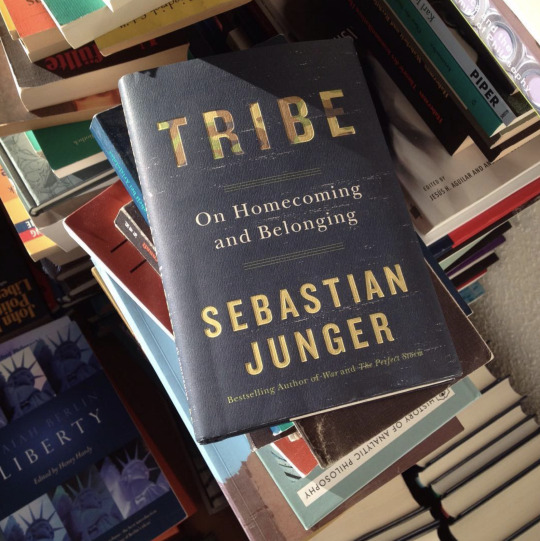
“Humans don’t mind hardship, in fact they thrive on it; what they mind is not feeling necessary. Modern society has perfected the art of making people not feel necessary. It's time for that to end.”
- Sebastian Junger, Tribe: On Homecoming and Belonging
The phenomenon of tribal solidarity is the subject of Sebastian Junger’s enthralling book, Tribe: On Homecoming and Belonging. Junger offers a rich but unevenly researched patchwork of history, psychology, and anthropology to explore the deep appeal of the tribal culture throughout history. The result is less of a tour de force book that I would have expected from the likes of Sebastian Junger than an interesting and thought provoking read. Certainly it should be read by anyone interested in the human condition.
As a British ex-military veteran and a fan of Junger’s other books I naturally found it fascinating.The memory of my most recent tour in Afghanistan was still raw upon my return to Britain. Although the book really focuses on returning American army servicemen and their integration back into the American ‘tribe’ there were several themes that I and many others who had seen war could readily identify with.

“Tribe” is not a typical Junger book. He doesn’t tell one knockout story, as he did in the “The Perfect Storm,” which made him rich and famous, or as he did in “War,” which — along with his documentaries “Restrepo” and “Korengal” — established him as one of the world’s most mesmerising chroniclers of the Afghanistan war. Rather, he gives us an extended-play version of an article he wrote for for Vanity Fair — one that’s part ethnography, part history, part social science primer, part cri de coeur. Junger previously served as a war correspondent for Vanity Fair, embedding for long stretches at remote American outposts in Afghanistan’s frightful Korengal valley. This experience may help explain his interest in the intimate bonds that define tribal societies as well as the despair that can come from being wrenched out of a situation that makes those bonds necessary.
Junger’s premise is simple: Modern civilisation may be awesome, giving us unimaginable autonomy and material bounty. But it has also deprived us of the psychologically invaluable sense of community and interdependence that we hominids enjoyed for millions of years. It is only during moments of great adversity that we come together and enjoy that kind of fellowship — which may explain why, paradoxically, we thrive during those moments. (In the six months after Sept. 11, Junger writes, the murder rate in New York dropped by 40 percent, and the suicide rate by 20 percent.)
“I do miss something from the war,” Bosnian journalist Nidzara Ahmetasevic tells Sebastian Junger halfway through the book. Ahmetasevic is talking about the wartime closeness she shared with friends in a basement bomb shelter in besieged Sarajevo. “The love that we shared was enormous,” Ahmetasevic says. “I missed being close to people, I missed being loved in that way.”
The sentiment lies at the heart of Tribe, a book offering a surprising thesis about the ways humans have traded communal belonging for excessive safety.
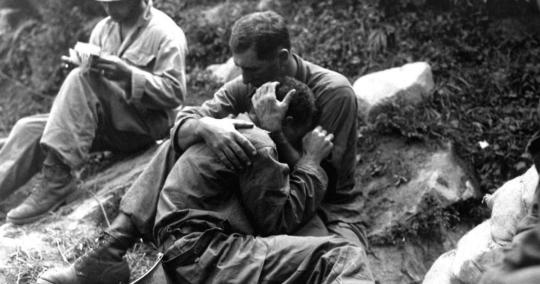
Junger gets a considerable amount done in a quick 133 pages: Tribe posits a reason why white settlers found life among Native American tribes appealing, theorises about false PTSD claims among returned U.S. veterans, and conveys the author’s equality-minded view of how heroic behaviour varies between genders — all in addition to remarks on hitchhiking, attachment parenting, Junger’s dad’s opinion of military service, and more. It’s an awful lot of ground to cover in such a short book, and it’s inevitable that Tribe would either feel inchoate and sketched or else aggravatingly dense. Because Junger is an adventurous storyteller (rather than, say, an academic theoretician), he opts for the former.
It’s not necessarily a good thing. The book’s lightness makes it accessible, an easy entry point to weighty subject matter. But its concision can make Tribe feel breezy even as it discusses life and death — if not sometimes confusing.
As a former anthropology major, Mr. Junger takes a special interest in tribal life. He notes that a striking number of American colonists ran off to join Native American societies, but the reverse was almost never true. He describes the structure and values of hunter-gatherer groups, including the ones that lasted well into the 20th century, like the !Kung in the Kalahari.
Unfortunately, these parts of the book are also the dullest and most problematic. There’s a numbingly familiar quality to much of the social science research he cites. It is not exactly news that nations with large income disparities are less happy than those without them, or that group cooperation increases levels of oxytocin, the bonding hormone. He notes, for example, that American mothers in the 1970s had a level of skin-to-skin contact with their babies that traditional societies would consider criminally low. Fair enough. I wonder, though, if he realises that in saying this he’s crashing open the gate for every helicopter parenting (or attachment-parenting) demagogue out there? And that parents who actually have to go to work for a living - and therefore can’t have their babies pinned to their chests all day long for three years straight - will read these words and start rolling the eyes back in disbelief.

Though Junger cautions against romanticising tribal cultures, he sometimes does exactly that, and in ways that can be annoying. Tribe aptly opens with Benjamin Franklin’s observation, decades before the American Revolution, that more than a few English settlers were “escaping into the woods” to join Indian society. Franklin noticed that emigration seemed to go from the civilised to the tribal, but rarely the other way around. White captives of the American Indians, for instance, often did not wish to be repatriated to colonial society. At this distance, it is simply astonishing that so many frontiersmen would have cast off the relative comforts of civilisation in favour an “empire wilderness” rife with Stone Age tribes that, as Junger notes, “had barely changed in 15,000 years.”
The small but significant flow of white men — they were mostly men — into the tree-line sat uncomfortably with those who stayed behind. Without indulging the modern temptation to romanticise what was a blood-soaked way of life, Junger hazards an explanation for the appeal of tribal culture. Western society was a diverse and dynamic but deeply alienating place. (Plus ça change…) This stood in stark contrast to native life, which was essentially classless and egalitarian. The “intensely communal nature of an Indian tribe” provided a high degree of autonomy — as long as it didn’t threaten the defence of the tribe, which was punishable by death — as well as a sense of belonging. Tribe is then essentially a critique of modern civilisation, beginning with Junger’s observation of the inexorable appeal of Native American way of life to early settlers (“The intensely communal nature of an Indian tribe held an appeal that the material benefits of Western civilisation couldn’t necessary compete with”).
“The question for Western society isn’t so much why tribal life might be so appealing - it seems obvious on the face of it - but why Western society is so unappealing.” Junger is making a provocative point, but he is no provocateur. He swiftly justifies this jarring idea:
On a material level it is clearly more comfortable and protected from the hardships of the natural world. But as societies become more affluent they tend to require more, rather than less, time and commitment by the individual, and it’s possible that many people feel that affluence and safety simply aren’t a good trade for freedom.

All of these points have been covered in other, heavier books. Jared Diamond’s The World Until Yesterday examines traditional tribal lifestyles’ usefulness in the present day. The entanglement of war with human closeness and purpose is the focus of Chris Hedges’s War Is a Force That Gives Us Meaning. (Both Hedges and Junger include the same anecdote, in fact, about a teenage couple in besieged Sarajevo, that dies, sniper-shot, on the banks of the Miljacka River.) Junger also briefly mentions the work of seminal disaster researcher Charles Fritz, noting that Fritz could find almost no examples of mass panic during large-scale disasters. This plays into his overarching point that difficult experiences can be unifying rather than shattering. The exact same studies by Fritz and fellow researchers — and that exact same, crucial point — are detailed in Rebecca Solnit’s brilliant A Paradise Built in Hell.
Junger uses these insights towards another point. “Because modern society has almost completely eliminated trauma and violence from everyday life, anyone who does suffer these things is deemed to be extraordinarily unfortunate,” he writes. “This gives people access to sympathy and resources but also creates an identity of victimhood that can delay recovery.” This is an important observation. It, too, resonates quite closely with previous work - in this case Harvard psychiatrist Judith Lewis Herman’s seminal book Trauma and Recovery, which remarks that “to hold traumatic reality in consciousness requires a social context that affirms and protects the victim and that joins victim and witness in a common alliance.”
At best what Junger tries to achieve, then, is to assemble parts of all those books into one slim volume. So much the better for the busy reader. Unfortunately, Junger’s quick look at violence, trauma, and modern anomie also omits important information from other books, and as a result ends up on shaky ground, failing to consider counterpoints or bring its own arguments to a close.

Junger in the second half of the book proceeds through an examination of how disastrous or violent circumstances can create similar human closeness, and includes a discussion of how our society’s distancing itself from such harsh conditions has inadvertently sharpened those events’ capacity to traumatise the people who endure them.
War is hell, so this scourge of loneliness may seem the inevitable price for those who fight in them. The second half of Tribe insists that this impression is gravely mistaken. “Studies from around the world show that recovery from war is heavily influenced by the society one belongs to,” Junger observes. Iroquois warriors, for instance, did not have to contend with much alienation because the line between warfare and normal Indian society was vanishingly thin. This is not to deny that the Iroquois were traumatised by combat, but it was generally acute PTSD, limited in duration and distress. Their trauma was ameliorated by the fact that the trauma was shared by the entire tribe.
War, then, for all of its brutality and ugliness, satisfies some of our deepest evolutionary yearnings for connectedness. Platoons are like tribes. They give soldiers a chance to demonstrate their valour and loyalty, to work cooperatively, to show utter selflessness.
Is it any wonder that so many of them say they miss the action when they come home?

Part of the takeaway from this book is that regarding military service as a source of permanent psychiatric disability is incorrect for most (American) soldiers. Junger includes a lengthy discussion of how the U.S. Veterans Administration mishandles former soldiers’ mental health issues, and how America’s cultural misunderstanding of war plays into that deleterious milieu. The information isn’t wrong per se, but what it has to do with the rest of the romanticising of foregone tribal way of life, etc., or why that necessitates anything more than the 2015 Vanity Fair article from which the book sprung is never quite made clear. Worse, Junger says that the low rate of combat engagement among U.S. soldiers means their diagnoses of post-traumatic stress disorder often aren’t real - but he fails to consider that some soldiers develop PTSD from military sexual trauma, or from other adverse experiences outside of combat or before their enlistment.
Worse, he seems to misunderstand the diagnosis entirely. Here, as in the Vanity Fair article, Junger describes his own bout with what he calls “classic short-term PTSD,” departing from this insight to further dissect trauma and the ways modern society misunderstands it. The problem is, there really is no such thing as “short-term PTSD.” It sounds like what Junger had was post-traumatic stress, a weeks - or months - long psychological adaptation to adverse events (in his case, exposure to war) that typically resolves on its own.

Although psychological care can sometimes be relevant, most mental health professionals don’t regard this as an illness. (Tellingly, Junger’s approach to his diagnosis involved little more than an acquaintance’s ad hoc comment at “a family picnic.”) Post-traumatic stress disorder is only diagnosable after three to six months, does not often go away on its own, and can endure for a lifetime if untreated. The implication that Junger’s case is typical PTSD is misleading - and to some extent, calls his conclusions into question.
The problems in his argument go even deeper. “In Bosnia — as it is now — we don’t trust each other anymore; we became really bad people,” Ahmetasevic tells Junger. “We didn’t learn the lesson of the war, which is how important it is to share everything you have with human beings close to you.” Junger’s thesis is that other cultures (the “Stone-Age tribes” white settlers once joined) did learn that lesson. But he assumes that violence is innate to humans and necessary for human closeness, never parsing evidence that it is not. And he doesn’t examine what this Bosnian journalist means by “really bad,” and how becoming so after the war might have arisen directly from the painful, long-lasting effects of the severe trauma Junger doesn’t quite seem to believe in.
If there is any doubt on this point, consider the alarming rates of PTSD among our warrior class, and the desire among many of them to return to war — a subject on which Junger has been at the leading edge of the public discussion. When combat vets return home, the alienation and aimlessness of modern society aggravates their psychological traumas and prompts them to yearn for the brotherhood of combat. It’s not for nothing that a recent book on post-traumatic stress is entitled The Evil Hours.

Many soldiers actually miss war. “Adversity,” he writes, “often leads people to depend more on one another, and that closeness can produce a kind of nostalgia for the hard times.” Soldiers go from a close-knit group in which everyone has a purpose to a society in highly individualised lifestyles are “deeply brutalising to the human spirit.” Soldiers who come home to situations in which there is no social support from family and community are more likely to suffer PTSD than others.
Thanking veterans for their service aggravates the problem, in Junger’s opinion. “If anything, these token acts only deepen the chasm between the military and the civilian population by highlighting the fact that some people serve their country but the vast majority don’t.” Tickets to games and other such perquisites can incentivise veterans to see themselves as victims, making their reintegration into society much more difficult.
What they really need is the one thing that will make them feel like valuable members of society: jobs. In their tribe-like military units, they each had a specific function without which the group could not perform. The worst thing that can happen to them when they return is to feel useless, marginalised. The suicide rate in America mirrors the unemployment rate, Junger points out. The best protection against devastating depression is meaningful work.
“Ex-combatants shouldn’t be seen - or be encouraged to see themselves - as victims,” writes Junger. Lifelong disability payments for PTSD, which is treatable and usually not chronic, actually debilitate veterans, Junger claims. In war, the passivity of victimhood can be deadly, he explains. Turning veterans into victims when they return is not only confusing but also destructive because it erases their sense of self. Instead of sympathy, “veterans need to feel that they’re just as necessary and productive back in society as they were on the battlefield.”
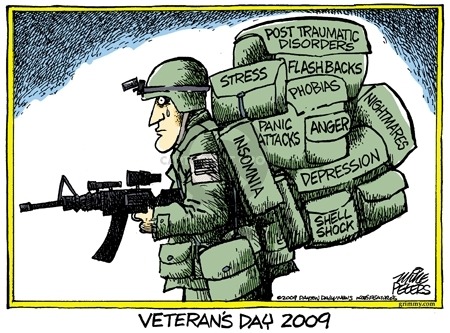
Of course much of this book is really around the American experience of war and the experiences of American veterans returning home. So some points don’t quite stick with either British or European experiences. For example neither British or other European societies thank veterans for their service as a matter of course. Of course there are special days to commemorate major war events and even an armed forces day but on a general day to day basis one doesn’t go up to a military person to thank them for their service probably because British and European servicemen and their service don’t enjoy a privileged standing. Respected and admired yes, but not deified. How British and other European countries take care of their returning veterans is hard to detail as the experience varies in terms of disability allowances and other measures. Certainly a misunderstanding of mental trauma or PTSD of returning veterans has led sometimes to a criminal mismanaging of taking care of those most affected. Again, it varies from country to country.
Contemporary America is a considerably less consolidated society than it used to be. Cultural diffusion and economic stratification have increased the isolation felt by those who have borne the heat and burden of battle. I won’t a forget photograph shown to me by an older brother who had served with distinction in Iraq. He made a few American friends from the US soldiers serving there alongside and one day he was shown something that captured the dark humour and cynicism of war. The photo captured a graffito scribbled on a wall in Ramadi, Iraq, that read: “America is not at war. The Marine Corps is at war. America is at the mall.”
Multiple studies demonstrate that “a person’s chance of getting chronic PTSD is in great part a function of their experiences before going to war.” The relationship between combat and trauma seems to be a murky one. For instance, “combat veterans are, statistically, no more likely to kill themselves than veterans who were never under fire.” Junger says that even a significant number of Peace Corps volunteers report suffering severe depression after their return home, especially if their host country was in a state of emergency when they did. In Junger’s telling, particular burdens endured by socially disadvantaged Americans - from a poor educational background to chaotic broken family life - can make a candidate especially susceptible to PTSD. Indeed, these risk factors “are nearly as predictive of PTSD as the severity of the trauma itself.”
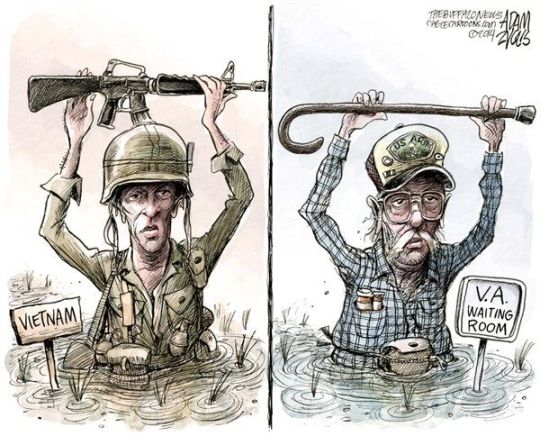
The decline of social order and solidarity has contributed to a loss of what researchers call “social resilience.” This has simultaneously supplied more potential candidates for PTSD and impaired society’s ability to help them recover. The United States must place a premium on boosting its levels of social resilience. Americans should no longer be content to simply thank veterans for their service; sporting events are not places of healing. Nor should they seek to outsource the responsibility to the federal government. The solution lies closer to home, in the mediating institutions of civil society — from families to churches to community and professional associations. I think this echoes the views of quite a few veterans in my experience with them.
More sensitively and perhaps controversially, ex-combatants shouldn’t be regarded, or encouraged to regard themselves, as victims. This I also agree with. America is still a tremendously affluent country, Junger writes, that can afford to perpetually care for a victim class of veterans dependent on government largesse, “but the vets can’t.” They have generally performed exemplary service for which they should be honoured, and they must know that their service is not over.
Next, Junger says, veterans (like most social animals) depend upon a sense of purpose that begins with a job and a position in society. Here the “hire vets” initiatives and retraining programs are necessary but insufficient. The traditional means of securing social resilience has been egalitarian social provision. Individualist America may blanch at that notion, but it should at least act to build a more open economy and inclusive culture where individuals can reliably advance by merit and develop social capital.

Not being an American I don’t wish to speak out of turn but as a veteran and especially in speaking with other British and foreign veterans I think Junger is on the right path. Victimhood and a lack of purpose are the unseen enemy that the returning veteran will continue to fight when he or she comes home.
To all this I would also that - arguably perhaps in America especially - a revival of national cohesion is needed if - as a nation that pays lip service to honour the sacrifices of its servicemen - it is to arrest the full savagery of battlefield trauma. This will require what Edmund Burke called “a revolution in sentiments, manners and moral opinions.”
One clue about how to achieve this can be found in the early pages of Tribe, when Junger tells an affecting anecdote about his father. Not long after the end of the Vietnam War, the author had received a Selective Service registration form in the mail, in case the United States government ever needed to conscript him into the military. When he announced that, if drafted, he would refuse to serve on political grounds, his father’s reaction caught him off guard. Although sternly opposed to the war in Indo-China, Junger’s father insisted that American soldiers had “saved the world” from fascism during World War II and many never came home. Junger writes;
“‘You don’t owe your country nothing,’ I remember him telling me. ‘You owe it something, and depending on what happens, you might owe it your life.’” This did not oblige anyone to enlist in an unjust war - “in his opinion, protesting an immoral war was just as honorable and necessary as fighting a moral one” - but it did mean that the country had just claims on its citizens, and refusing to sign a registration form constituted a dereliction of duty.

Year after year, Americans hear arguments for taking the stink out of their sulphurous political rhetoric. It would be better for congressional productivity. It would be better for our international dignity. It would be better for their national literacy, their local advocacy, their general civility and the future etiquette of their children. But the one argument I had not heard, until reading Junger’s book is that they should clean up their act for the sake of their returning troops.
Junger never makes this point explicitly. What he writes, simply, is this: After months of combat, during which “soldiers all but ignore differences of race, religion and politics within their platoon,” they return to the United States to find “a society that is basically at war with itself. People speak with incredible contempt about - depending on their views - the rich, the poor, the educated, the foreign-born, the president or the entire U.S. government.” Soldiers go from a world in which they’re united, interconnected and indispensable to one in which they’re isolated, without purpose, and bombarded with images of politicians and civilians screaming at one another on TV and cable.
It’s a formula for deep despair. “Today’s veterans often come home to find that, although they’re willing to die for their country,” he writes, “they’re not sure how to live for it.”
With that, Mr. Junger has raised one of the most provocative ideas for bitterly divided Americans to grapple with without mentioning a single political candidate, or even a president, by name.
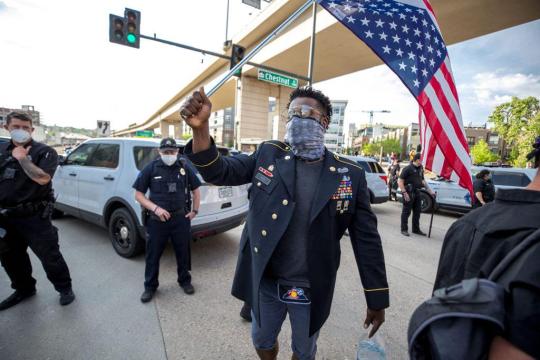
In this age of social and economic fragmentation, many of America’s disadvantaged fellow citizens have begun to chafe against an elite class - left and right - that often behaves as if it were exempted from the national compact. Junger only hints at the necessary leap beyond a social-psychological view to a political-economic analysis. He writes, "As great a sacrifice as soldiers make, American workers arguably make a greater one…. [w]orking in industries that have a mortality rate equivalent to most units in the US military." He suggests, "It may be worth considering whether middle-class American life - for all its material good fortune - has lost some essential sense of unity that might otherwise discourage alienated men from turning apocalyptically violent."
Nobody then should be surprised if the ranks of disaffected citizens – not least those who have borne arms in our name and in their defence - ultimately decide that the sensibility of the tribe is superior to their own.

As a proud Brit who is guilty at times of poking fun at America but borne out of sincere fondness and respect for America I do sincerely hope during these turbulent times that they are capable of coming together and recognising their tribal identity is to be Americans first and other labels (liberal or conservative or red state or blue state) whilst not inconsequential are not important enough to undermine the primary American tribal identity. They did it so marvellously after 9/11, but that feeling as we all know soon dissipated. It can’t afford to be a house divided from within when there are predatory wolves pawing at the door (I’m looking at you Russia and China). Junger correctly writes America is a strong nation, “The only one who can destroy us, is, well, us…..which means that the ultimate terrorist strategy would be to just leave us alone.”
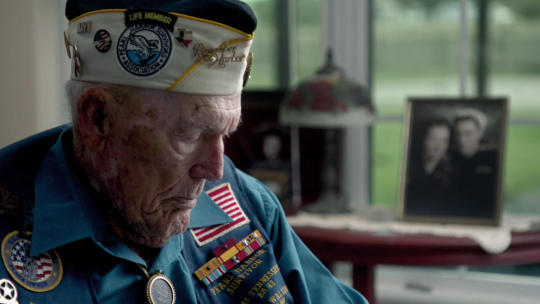
Tribe is an important, thought-provoking book that encourages Americans to see its veterans and American society in a fresh light. Policymakers of all political stripes would do well to consider Junger’s arguments, for as long as they fail to fully integrate returning soldiers, everyone will continue to pay a high toll for their incredible service and sacrifice.
Junger’s “Tribe” even if it was written in 2016, remains relevant and serves as an important wake-up call. Let’s hope we all don’t sleep through the alarm. But this too brief and too scattershot book with an important message won’t get us all the way there. There is an old South African Zulu proverb, ‘If you want to go fast, go on your own. If you want to go further, go together’. It’s up to all of us.
#treat your s(h)elf#book review#books#reading#sebastian junger#junger#tribe#war#battle#america#army#society#culture#anthropology#native indian#iroquoi#veterans#PTSD#integration#civilisation#state
196 notes
·
View notes
Note
AU where Quirin takes and raises Eugene after the DK falls
•| Send me a potential AU and I’ll tell you five fun facts |•
Oh you have no idea how much this enables me - I stand by Quirin raising Eugene until the end of time bc it’s what they BOTH deserve
1) Oki so, here we see Eugene taken away as a baby without disclosing an EXACT location — that will not stop Quirin though, who had a stance against cutting him off completely despite it being Edmunds orders [It made sense to send the boy away but to send him to an ORPHANAGE was another story] Quirin finds Eugene a month or so after they get separated, during that time he found a house and a stable farm to raise a kid on [Gotta have an income] and then promptly goes to the orphanage and adopts Eugene.
By then, Eugene’s name has already been changed and frankly... Quirin thinks it suits him, though he occasionally slips up and calls him Horace. He feels a duty to raise the Prince but also kinda has a “My son now” mentality! Disagrees with Edmunds choices + decides... His kingdom is doomed, so he’s gonna ensure Eugene gets a stable upbringing with KNOWLEDGE of the Dark Kingdom without necessarily telling him “Oh BTW you’re the prince”. Being a father is hard and he struggles a lot, esp in early days, it’s a whole new challenge from being a knight but... Not one he really regrets?
Cue some fluff! Knight-dad trying to raise a baby and establish a life in a new country — Over time he grows and becomes Village Leader + Develops a bond with the monarchs based on his knowledge and previous high-rank in society from being a knight! Gets offered a guard position but turns it down in favour of spending time with his toddler son. Eugenes first word is Dada and Quirins never felt so content. Baby fluff of Eugenes milestones — Quirin has Eugene helping on the fields as soon as he can toddle without tripping (tho it’s mostly Eugene playing and running around while Quirin works) Toddler Eugene is a little darling and knows exactly how to use his cuteness to get praise and sweets
2) Eugene starts thievery / acting out soon after Quirin dates and marries Ulla, though it soon become a hobby he usually indulges in with his friend Arnie [though they take on the names of the coolest book characters Flynn Rider and Lance Strongbow!] Quirin thinks it’s just a phase and leans into the whole calling Eugene ‘Flynn’ because... He really loves the books, that’s not too odd? Though he doesn’t know of crimes + just thinks they go out to play a lot. Eugene ignored Ulla for the first few weeks because he doesn’t like the idea of someone new staying around — He doesn’t hate her, it just raises a lot of questions about his mum that Quirin doesn’t know how to answer... He resolved on the explaination that she was very sick and couldn’t take care of him anymore, though loved him dearly — it’s enough to placate him.
Eugene doubles down on stealing when he’s 10 and suddenly there’s gonna be a new baby in the house. [He doesn’t WANT a sibling + worries Quirin will love the baby more than him since he knows he’s adopted & all that though is too scared to ask] Eugene grows an attitude and Quirin finds himself exhausted and constantly caught in petty bickers as Eugene keeps running away + acting up, especially to his wife (Who loves Eugene very much, of course) ‘Flynn’ declares he wants to travel the world and be far away from step-mums and nasty babies, uhhh Domestic fall out stuff?
Things change when baby gets here and suddenly Eugene is a big brother and Quirin is MORE distracted, sometimes they forget to even read him a story and he can’t stand the squirmy little creature... All it does is cry and take what little attention his misbehaviour had earned him... So naturally, petty crime continues + Eugene starts caring less about getting caught, so it becomes more risky. He and Lance befriend some bad influences and start taking Big Kid Crime. It’s fun! Until Eugene is brought home by a guard and Quirin gives him the silent treatment for the next week. Quirin... He loves his sons, both of them, but he just isn’t sure how to handle a distressed 11 year old and a baby, it feels like there’s not enough hours in the day and Eugene is SET on making life harder for everyone.
Eugene stays against ‘Varian’, frequently makes the baby the villain in his games and makes him cry on several occasions. It gets even worse when he starts crawling bc now he can’t get anytime alone, it’s just frustrating! The solution probably comes when Varians starting to talk and he says ‘Oo-gee’ as one of his first words — ‘Lisa’s first word’ style — and Quirin and Ulla admit that Varian is obsessed with Eugene. It’s sorta a wake up call for Eugene to start trying to get along with the kid, and it works! He finds it fun to teach him things & have someone to talk to (even if he just babbles back) By the time Eugene is 12 he’s calling Ulla mum and love spending time with his little brother
3) Right! When Eugene is about 18 he picks up theiving again, mostly because he isn’t suited to the farm life and it’s easy money (Plus how else is he gonna achieve his dream of financial independence?) He moves out the farm under the guise of finding a new life with his best friend, though they quickly realise it’s not amazing when they get tangled up with the Baron + his antics. Eugene visits home every so often and claims everything is fine, it’s going great, he doesn’t need any extra help + his life is just dandy. His dishonesty mostly bc he doesn’t wanna worry Quirin and there’s been a bit of a strain since Ulla passed away.
Life keeps on like this. Eugene ages, steals alchemy supplies for Varian and hides his true income source because he wants to make Quirin and Varian proud! Varian grows up to be more headstrong in what he wants because he has someone standing up for him and telling him he’s proud, though the longer Eugene spends away the harder it gets? He loves it when Eugenes here! But the house feels empty without him, and Quirin is so busy + stressed from Varians experiments that there’s still that desire to do more, prove himself.
4) Movie diverts a bit! Eugene finds out about the hair glow and thinks... If one person knows about this then it’s him, and takes Rapunzel to Old Corona over night rather than a campfire. Varian is ecstatic to see him though gets confused by a random girl Eugene claims to have just found — He’s about to ask questions when Eugene asks if Varian could do his magic thing to find out about her hair. Varian insists it’s alchemy and agrees, dragging Raps down into the lab! Boop gothel talks to her when Varians gathering all the equipment and talks her ear off about how cool Eugene is and asks how they found each other since the story is weird... Experiements start!
Meanwhile Eugene is talking to Quirin, when Quirin pulls out a wanted poster and puts it on the table. He finally found out about how bad Eugenes crimes are and wants answers. Now. Eugene sits and tries to explain its not what it looks like, but Quirin doesn’t wanna hear it. The disappointment is evident and Quirin criticises “I thought you grew out of this, what role model is this for Varian?” Eugene doesn’t have an answer but argues his case that it was to be reliant — and he doesn’t wanna do it anymore anyway! Quirin accuses him of using the girl, while Eugene insists her name is Rapunzel and he’s just helping her, get the crown, be set for life and never have to bother him again.
Their argument is cut short by a Varian coming back upstairs looking frazzled, says there’s something about the magic that’s familiar but he can’t place it — sure is strong tho, and continues gushing and asking Eugene for all the details of what he’s been up to. Eugene... Explains, his usual light-hearted rendition of a great quest, while Quirin leaves and stays upstairs the rest of the night.
Varian sees them off in the morning! Hours after they’re gone Vari is still looking into the magic thing — that’s when he remembers the old legend about a sundrop... about how it saved the Queen... About the Princess. Varian sneaks out the house and heads up to the lantern festival to tell Eugene and Rapunzel his revelation, but he gets there just as Eugene is being lead away by guards. Varian finds Max and tells him how they need to free Eugene + basically... Helps him escape with fewer pub thugs and more alchemy. When they get to the tower Eugene tells Varian to stay on the floor and climbs up to help Raps - Varian stays at the bottom of the tower for approx 10 minutes before finding the back entrance and climbing up. Figure he gets there just as Gothel deages, it’s suddenly and before anyone knows it Varian is the one pushing her out the window bc he saw a stabbed Eugene and put two and two together. Then! Cue New Dream scene, except Varian is sitting on the floor in shock a distance away... After New Dream hug Eugene looks at him and Varian admits that “Ok, magic isn’t that bad”
5) Oh god the series! First off — Raps is closer with Varian in this (that’s becoming a theme...) so doesn’t just throw him out into the blizzard when he comes asking for help. Instead he and Eugene go back to Old Corona together after the storm, Varian isolates himself from guilt + has a tough time dealing with what happened, but he lives in the castle as Eugene starts getting angrier with the king and wants answers for what happened. He’s the one that finds Dark Kingdom stuff and he and Varian work on it together... Eugene has a suspicion he came from the Dark Kingdom so when the rocks start pointing there he’s like dope!
No villain Varian joins them on the trek to the Dark Kingdom + it’s all fun and games, Eugene tries to get more answers from Adira as they travel but she says it’s not her place to say... All he needs to know is the kingdom fell, and everyone was evacuated... She’s almost annoyed as she explains it, then Hector is treble annoyed when he finds out Eugene was raised by QUIRIN since that went against the direct orders... Though Adira defends it and says he was doing his duty of keeping Eugene safe, it’s basically a rift between them that’s confusing until they get to the DK and the revelation happens.
I feel... Moongene could be a thing in this AU? but since I’m running out of points I’ll leave it with Cass taking her canon role! I will point out! when Quirin is freed initially only Varian runs into his arms... Eugene hadn’t really spoken to Quirin properly since their movie fallout & he’s not sure he belongs... Until Quirin holds and arm out to him and pulls him into the hug too (PARALLLELS) and we get a happy reunited family (tho with some issues to work out regarding somethings... they need to rebuild trust, but work on it slowly. Edmund stays ‘Edmund’ to Eugene. He sees Quirin as his father & doesn’t push as much to reconnect with Edmund... Though that makes it easier in a way. There’s less pressure once Edmund understands and they form a friendship, but Quirin is Dad 100% (Sometimes Edmund gets called Dad 2))
74 notes
·
View notes
Text
Limitlessness within you

We have heard that we are limitless, infinite. It is written in every holy text irrespective of religion, many masters have mentioned in their discourse. During the guided mediation, one may have experienced it.
Yet , like me how many of us have genuinely believed in the same or have experienced it in real life. I never ever thought that it is possible to experience some amount of expansiveness, nothingness beyond mediation. I missed the point it appears. Limitlessness is not only an experience , it is a energy shift. Shift of our viewing, hence we call it reviewing.
When I read this quote ( yes, I have fascination for quotes ), I loved it , yet the depth of quote was illusionary.
"Greet yourself
In your thousand other forms
As you mount the hidden tide and travel
Back Home "
~ Hafiz
One day on my regular morning in a garden across my home, I was doing walking meditation. Bare foot , stepping on the soft grass gently and focusing on my breath. Eyes cast down at an angle of three feet. Moments passed by and I sensed the softness under my foot like a silk. I was stepping on the flowers which fell from the tree under which I was then enjoying my walk. I looked up , a Gulmohar tree in our local language or Royal Poinciana as called in English in full bloom. The sight of the bloomed tree was magnetic, it transported me to my last year memory in Abu Dhabi where I was stranded alone during worldwide lockdown. During any meditation, we practice observing the thoughts and feeling, so I allowed this memory to flow. I happen to recall the trees near my Abu Dhabi home , it was also blooming during the same time. I paused there and then sat on the ground, closed my eyes and went into inquiry mode. What is this familiarity trying to express ?
Is it the tree that is trying to tell me something ? It was the seed that soon connected with me. The seed had the complete blueprint of its evolution ( this is something I had already shared in my previous blog), however the seed which looks stagnant travels. This travelling is done through various known and unknown supports. The wind, birds, soil erosions, volcano , earthquake, human all could be one carrier or could be many. One seed has limitless possibilities.
It will grow into a tree, where , when and how is not its concern. The seed knows it will grow. The birds would carry it few miles. Then the wind would carry it few countries. The water or other nature elements would do its bit. Finally, when it is growing , the human and the nature that would benefit. This is the limitless possibility of that one seed.
When we feel limited, ask yourself is that true? When I call out a word, if you pay attention some memories will get triggered. Good, bad ,ugly, marvelous so on. It is usually about some interaction, feeling that is there in our programming mind. For example - When I say the word " Cab/Taxi/travel ". This may trigger a memory of your last ride or an un-forgetful ride. It is usually the person, whose name you may not recall yet the memory stayed. He or She has touched you in a way that is unforgettable.
You could be one of the person , when the driver think about a passenger , he would recall you. We have or rather we can leave our impression, imprint in anything and everything if we conduct ourselves mindfully. That is our limitless possibilities. It does not always require a glamourous status or position to be limitless. It is a myth that only celebrities are famous. In fact, it is reverse, their followers are quantifiable based on their act which could be superficial too.
You have the potential to touch innumerous amount of people. That is the limitlessness within us.
I sat in gratitude under the tree for sharing the profound perspective of life.
My teacher Nithya Shanti says " Anything and everything can teach you life lessons, all you have to tune-in to that object and open enough to receive the lesson of life".
So next time, when you are in hurry Pause. When you are angry , just ask yourself what is the imprint that you are going to leave in that moment which would never come back. Like me, you may fail 3 times a day , when you do everyday it is possible that there would be a day when you have never failed an opportunity to touch another human life with kindness, generosity and your truthfulness. The seed with you is waiting to bloom , just be in allowance.
#storytelling#true story#magical stories#buddism#awareness#alan watts#sri nisargadatta maharaj#mindfulness#tumblog#writeundertheinfluence#compassionatereminders#wu hsin#new to blogging#excerpt from a story i'll never write#write your feelings#lifeisbeautiful#follow my blog#writer introspection#gratitute#followmypage#buddhism
20 notes
·
View notes